INSIDE:
■ Vocation stories
■ JP II’s guide to holiness
■ The family as the seedbed of vocations
■ The role of the lay vocation
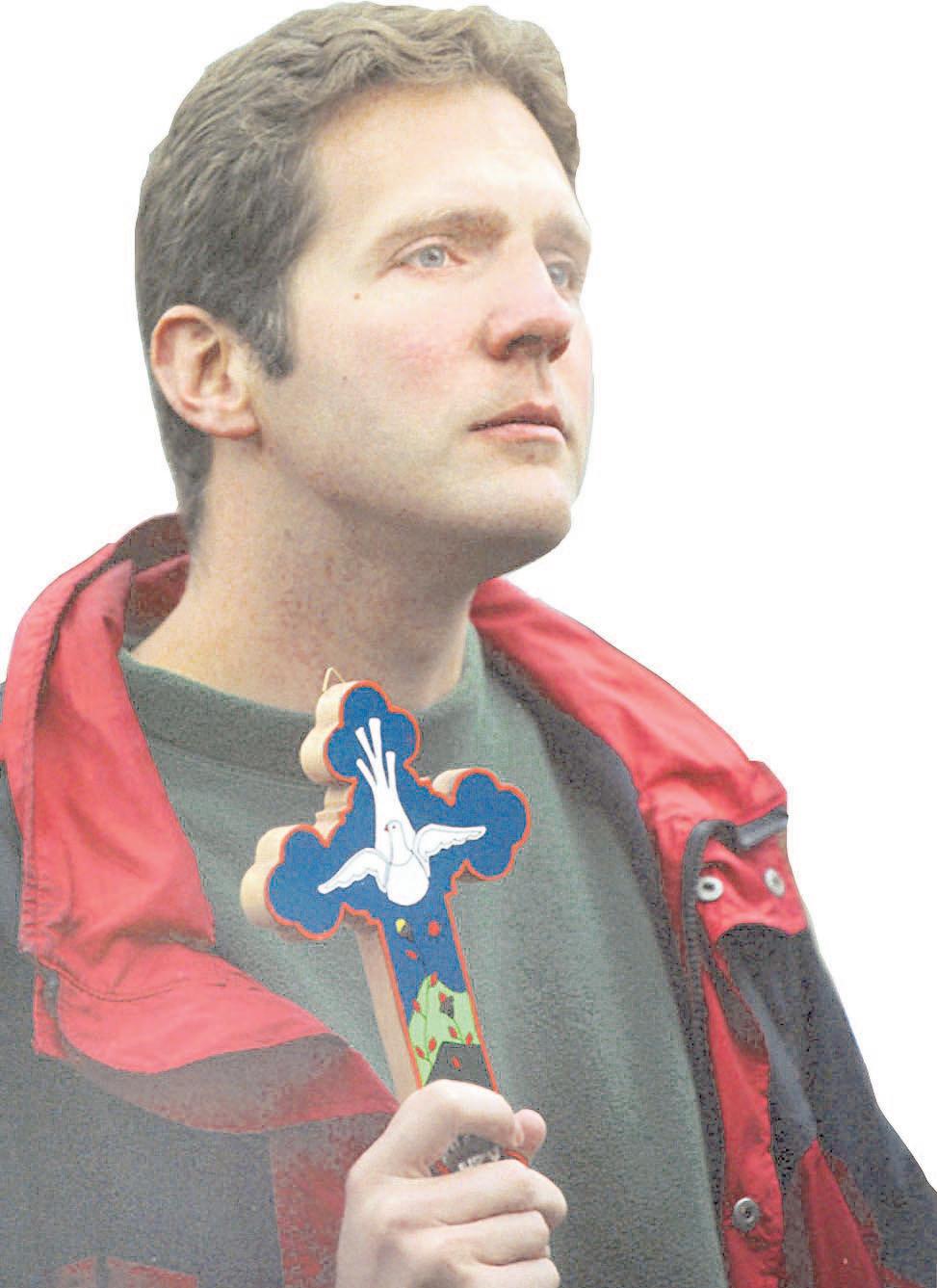

What in the world has God got in store for you?
V O C A T I O N E D I T I O N
DISTRIBUTION
The Record, established in 1874, is distributed to Catholic Churches, presbyteries, religious houses and subscribers throughout the Archdiocese of Per th, Geraldton, Bunbury, Broome and overseas.
THE TEAM
Managing Editor Peter Rosengren
Production/ Advertising Eugen Mattes Carole McMillen
Office Manager Kylie Waddell
JOURNALISTS
Bronwen Clune Debbie Warrier
CONTRIBUTORS
Hugh Ryan, Paul Gray, Fr Tim Deeter, Tony Evans, George Russo, Peter Dwan, Norma Woodcock, Guy Crouchback
SUBSCRIPTIONS
Subscribe to The Record (46 issues) and Discovery (6 issues) $55 per year.Send subscription with cheque or money order.
ADVERTISING
Editorial:Tuesday
first mail
Advertising:
Booking:Monday
midday
Copy:Tuesday midday
CONTACT US
587 Newcastle Street, West Perth, WA 6005 POBox 75, Leederville, WA 6902
Tel.9227 7080
Fax 9227 7087 or find us on the web www.therecord.com.au
Editor cathrec@iinet.net.au
Classifieds/ Advertising mattesrec@iinet.net.au
Accounts cathadmin@iinet.net.au
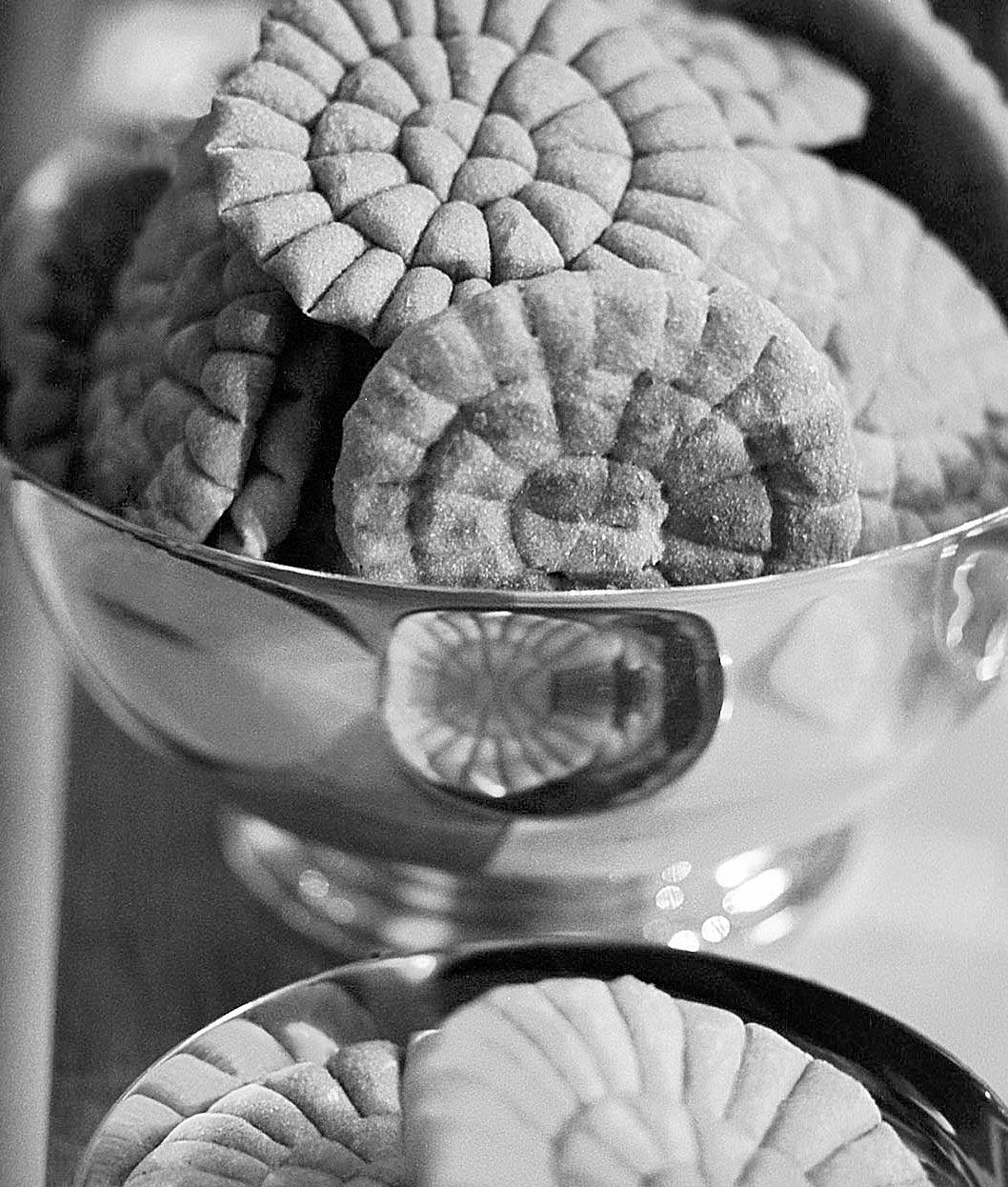
Welcome to our call
Welcome to this second Vocation edition of the The Record –an edition in which readers, contributors and correspondents issue a special call to everyone to remember that every human life is significant. It is probably true that most people do not see themselves as having a particular vocation – a special call to a career or a particular line of work. Many of us simply take the opportunity that is available to us when we leave school and proceed from there. One of the important messages of this edition is that life is no less a vocation for the absence of an evident path through most of it.
Life is our vocation; work is merely one expression of it.
A vocation is a call, and a call requires a caller.
The voice that is calling is the voice of God who breathed his life into us and is calling it back to union with him.
The vocation of our life is to express this image and likeness of God in whatever circumstances present themselves.
There are other calls, often louder and more insistent, and there is a lot of static to drown the authentic call, but it is never too late to hear the one that matters.
There are many stories in this edition, each one revealing aspects of the call to live life in its truthfulness, stories about:
● the priesthood.
● faithful and enduring marriage.
● the joys and challenges of parenting others as they respond to their vocation.
● the reality of vocation in human gifts and human handicaps.
● vocations found, lost and recovered.
All of them have their surprises, and all of them in their own small way reveal the wonder of how each human life contains the essence of all human life. We hope they help you find and enjoy the wondrous meaning that is contained in your life.
REDEMPTORISTINES
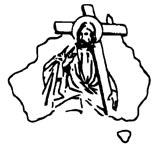
If you would like to know more about life as a Norbertine priest or brother, please contact:
Fr Peter J Stiglich, O.Praem.
St Joseph’s Priory PO Box 354 Cannington WA 6987
Telephone: (08) 9458 2729
Email: norbert@iinet.net.au
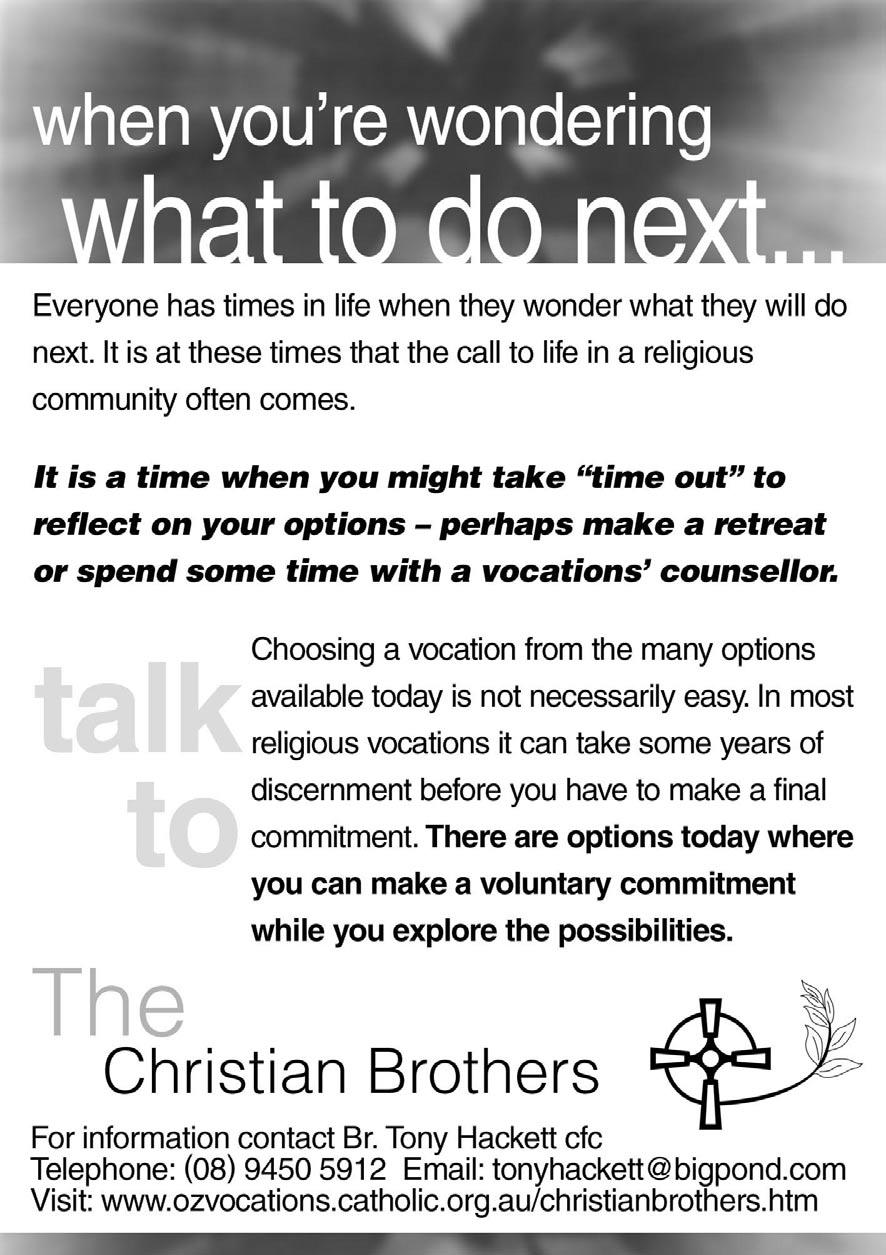
FULLY CONTEMPLATIVE
We follow the path of the Redeemer. At the service of the Missionary Church,our life is an offering,for the salvation of all humanity.
Spend a quiet day,weekend,or week ‘experiencing God’in the peaceful monastic setting - for individuals or small groups.
Monastery of the Most Holy Redeemer,Maitland NSW 2320
Ph:(02) 4930 1739 Fax:(02) 4930 0957 Email:redlines@hotmail.com
Website:www.rc.net/australia/redemptoristines

Family Counsellor/Group Facilitator Part Time (60.8 hours per fortnight)
i.d.entity.wa is an agency of the Roman Catholic Archdiocese of Perth that provides services to people with intellectual disabilities and their families.

We are seeking a dynamic person with the necessary skills and values to complement the Community Support Services team. The successful applicant will provide a holistic and responsive counselling service to individuals and families, and the opportunity for individual spiritual growth. The position offers an exciting challenge and flexibility for the successful applicant who will play a significant role in developing programmes and/or group facilitation to address identified needs. Applicants must have a tertiary background in Social Work, Psychology or a related field, and experience in Human Service delivery. He or she will have a broad experience and understanding of the provision of support and assistance to clients and families in relation to intellectual disability issues and concerns. They will be required to perform their role in accordance with the organisation’s philosophical bases of:
● Christian (Catholic) Ethos
● Social Role Valorisation
● Developmental Model
An attractive salary package is offered, and a job package, including the Job Description and Selection Criteria are available on request by phoning 9474 3303 or by emailing reception@identitywa.com.au.
Further enquiries, please contact Sharon Hill at the above number.
The closing date for applications is Monday 8 September 2003. Applications addressing the selection criteria and quoting reference number 75/03SH should be made in writing to:
The HR Administrator
i.d.entity.wa
P.O. Box 5
SOUTH PERTH WA 6951
The Record 2 21 AUGUST 2003 No. 3371
RETREAT UNITS - HUNTER VALLEY
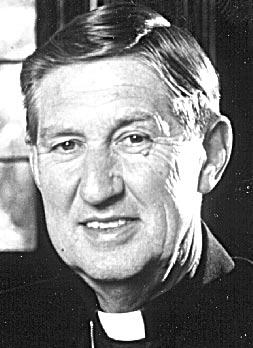
across recently was that many non-practising Catholic parents do not have their children baptised. I knew that to be true in some overseas countries, but I had always felt that at least here in Australia parents had their children baptised even if the motivation was not always impeccable.
“
The special challenge for which I am calling for vocations to the priesthood is very local - the drift from the Church and the loss of the young.
Two pieces of information over the past ten years have caused me to raise vocations to the priesthood to a high priority level.
One was a few years ago when I learned that not one boy or girl in Year 12 at a particular Catholic Secondary school went to Mass.
This floored me. I had no idea how bad the situation had become and I had no one to blame. I could not level the blame easily at anyone, not the school, not the parish, not even the parents.
Now, some years later the situation has not improved. Some young people in the last year of secondary school do go to Mass and continue after, but the majority unfortunately do not. The loss of young people to the active life of the Church will have catastrophic long term effects on our Catholic population if we do not address it with energy, wisdom and prayer.The other piece of information that I came


d N e w s e s p e c i a l l y t o t h e l o s t s h e e p . ”
The realisation has come that what is happening in some overseas countries like France and England is happening here, and that the further away parents are from the life of the Church the less likely they are tohave their children baptised!
These two pieces of information only make the urgency for evangelisation far more pressing.
Vocations to the priesthood today have a major focus - preaching the Good News of salvation. We are told in the Documents of the Second Vatican Council that this is the primary task of the priest. His sacramental and pastoral ministry is also essential but the callto spread the Good News of Jesus Christ is an urgent priority.
I want young men to be aware of the special challenges of today and to ask
vocations.com vocations.com vocations.com vocations.com vocations.com vocations.com vocations.com vocations.com vocations.com vocations.com vocations.
MEN OF HOSPITALITY
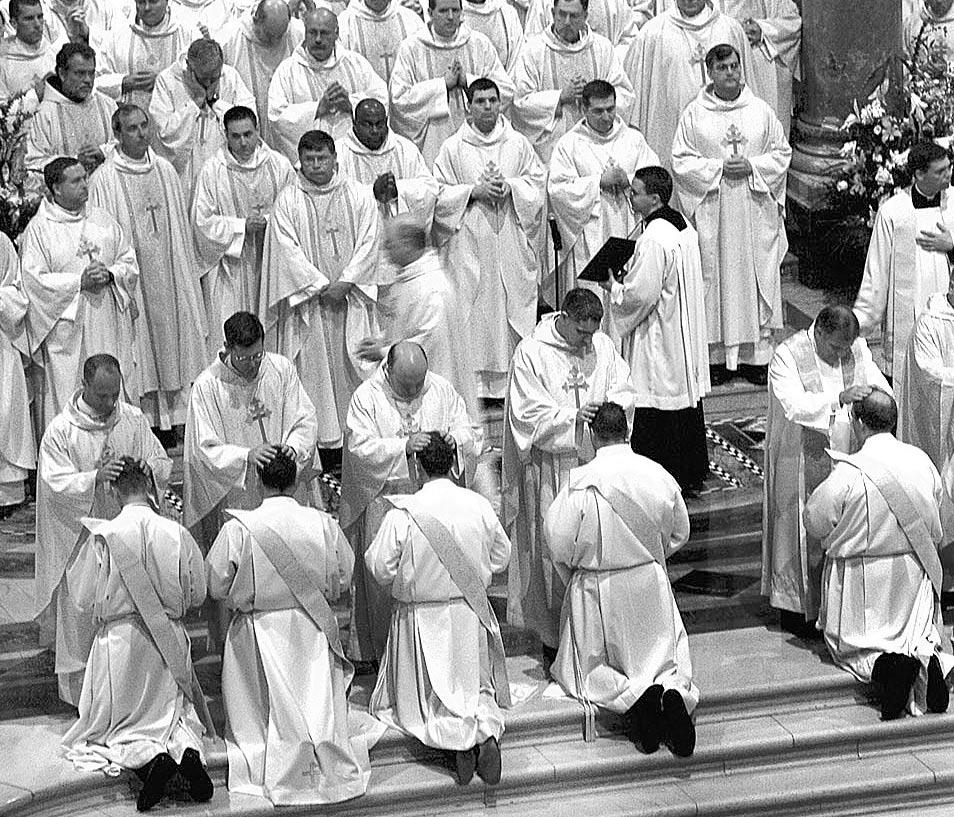
themselves if Christ is calling them to offer the Good News especially to the lost sheep. They are not called simply to maintain existing structures and services but to go out beyond the safe boundaries of Church life to those who need the Good News and invite them to enter the kingdom of God and follow the Way of Christ. Will this challenge be heard and accept-
ed?I have no doubt that many are being called. I also have no doubt that the great opportunities that this world offers young people can stifle and drown out the call of Christ. I only hope that the urgency of the situation we face today will touch the hearts of our young men and inspire them to leave all to follow Christ.
- PhotographCNS
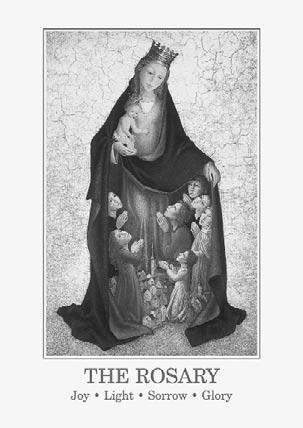
“Duc in altum!” – “Put out into the deep”.
Pope John Paul II has chosen these words of Jesus as the watchword of the Church as she advances with a firm and confident step into the third millennium. Now he has shed new light on the Holy Rosary for us too, and has entrusted it to us as a priceless means of help as we venture forth into the “vast ocean” of the new millennium. By adding the five Luminous Mysteries the Holy Father has enriched our prayer life. The Rosary booklet contains all 20 mysteries as well as excerpts from the Holy Father’s apostolic letter Rosarium Virginis Mariae, scripture readings, meditations and prayers.
This booklet is intended not only for those who have already enjoyed a Christian upbringing, but also for all those who were deprived of this and are therefore unfamiliar with the great treasure that is the Rosary. This beautifully illustrated little booklet is now available fora donation of $3.00 (includes postage). Also available are the Papal Rosary beads. To obtain the Rosary booklet and the Vatican Rosary beads we ask fora donation of $15.00 (includes postage). All proceeds will go towards the work of Aid to the Church in Need for the persecuted and threatened Church worldwide.
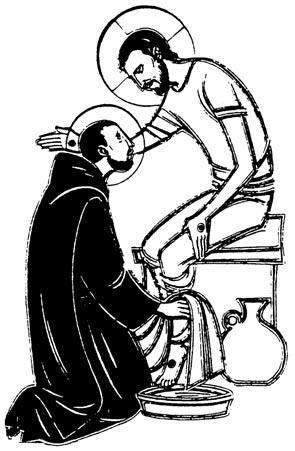
core of Hospitality compels and urges us to deepen our relationship with God, ourselves and with those whom we share our lives, community and ministry.

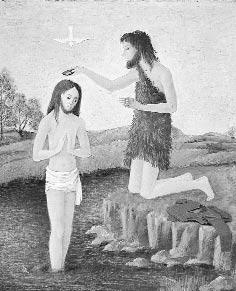

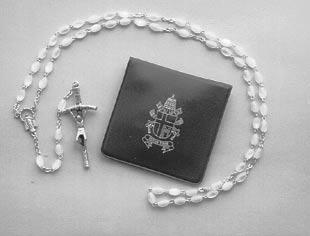
WE ARE THE: BROTHERS OF ST. JOHN OF GOD
Will you accept God’s invitation to a life dedicated to Hospitality?
Telephone : 02 9747.1699, Fax : 02 9744.3262 Email : jclegg@stjohnofgod.org.au
The Record 21 AUGUST 2003 3
The
Light, Sorrow, Glory Aid
Church
Need launches new Rosary booklet Featuring the 5 new Mysteries of Light Order Form: “The Rosary – Joy, Light, Sorrow, Glory Send to: Aid to the Church in Need, PO Box 6245 Blacktown DC NSW2148 Phone/Fax No: (02) 9679-1929 E-mail: info@aidtochurch.org Web: www.aidtochurch.org Please send me: Number Amount The Rosary booklet ($3)* . . . . . OR The Rosary booklet and the Vatican Rosary beads ($15)* . . . . . Charity donation (optional) . . . . . Total enclosed . . . . . *Postage included. Limit of 5 copies per order Signature . . . . . . . . . . . . . . . . . . . . . . .Exp Date . . ./ . . . BLOCK LETTERS PLEASE Mr/Mrs/Miss/Ms/Rev . . . . . . . . . . . . . . . . . . . . . . . . . . . . . . Address . . . . . . . . . . . . . . . . . . . . . . . . . . . . . . . . . . . . . . . . . . . . . . . . . . . . . . . . . . . . . . . . . . . . . .Postcode BankcardVisaMastercard Payment method:Cheque/money order enclosed OR Please debit my credit card AID TO THE CHURCH IN NEED A Catholic charity dependent on the Holy See, providing pastoral relief to needy and oppressed Churches PG Beautifully illustrated throughout. Just $3 a copy or$15 forthe Rosary booklet and Papal Rosary. A lovely gift idea! PG 517
Rosary – Joy,
to the
in
L I V I N G A N D P R O C L A I M I N G G O D ’ S H O S P I T A B L E L O V E “…the suffering of my neighbour breaks my heart…” (St. John of God. 1540) As lived out by St. John of God five centuries ago, our vocation is to give of ourselves completely and freely; to be a Brotherly presence; a symbol of hope for our world; proclaiming God’s Hospitable love. We are called to a charism of Hospitality and love that promotes healing, advocacy and reconciliation for those suffering in our society. Our
Contact Br. John Clegg. OH. Vocations Director P.O. Box BN 1055. Burwood North. NSW. 2134.
Brian Gardner’s HONDA 432 Scarborough Beach Road Osborne Park 6017 Phone: 944 99 000 DL0891 For the best deal on a new Honda, accessories, parts, finance or from our range of quality used vehicles. new@hondanorth.com.au www.hondanorth.com.au HONDA NORTH HONDA NORTH
-
new urgency
find it hard to talk of vocations to the priesthood in a vacuum.
there
from generation
generation,
country.
Priestly vocations
a
I
In my mind
is always a challenge, and the challenge varies
to
from country to
w a n t y o u n g m e n t o b e a w a r e o f t h e s p e c i a l c h a l l e n g e s o f t o d a y a n d t o a s k t h e m s e l v e s i f C h r i s t i s c a l l i n g t h e m t o o f f e r t h e G o o
I
A priest falls in love..
Join Join John P John P aul II in pr aul II in praayyer er AUGUST
General: That researchers,in scientific and technological fields,may welcome the Church's incessant calls to make wise and responsible use of the successes they have attained.
Missionary: That the catechists of the young Churches may bear witness faithfully to their attachment to the Gospel.
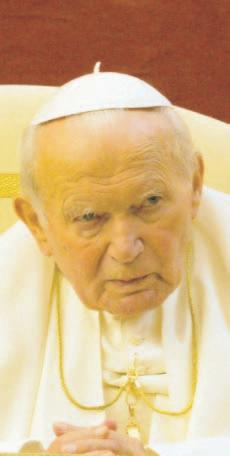


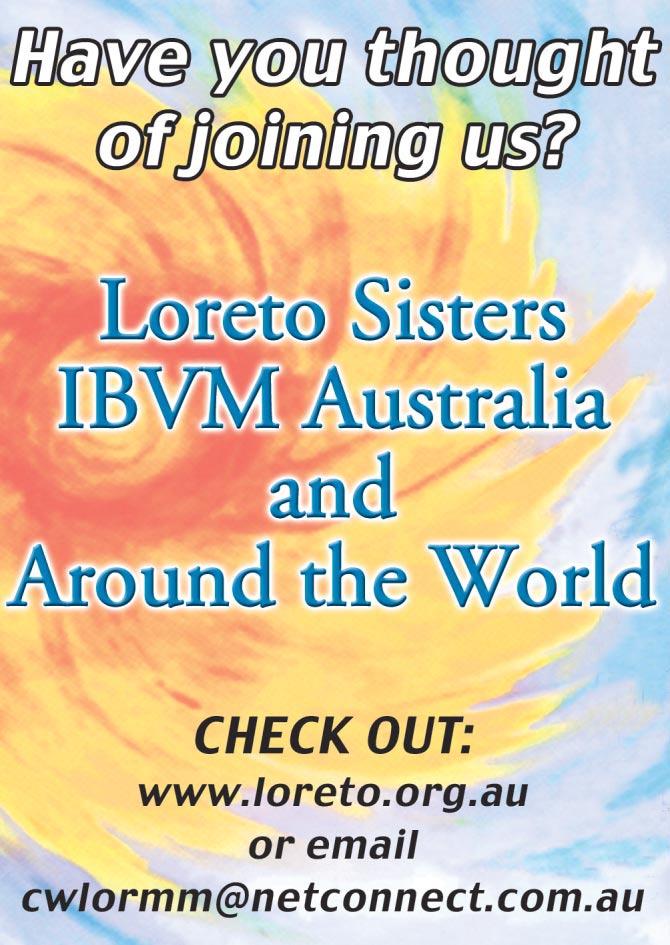

by Father Hugh Thomas
Recently flicking the TV dial while waiting for the news I struck a climacic moment in a TV special, they were about to reveal the most watched and celebrated moment in the history of Australian TV. I waited expectantly. What would it be? The setting was a church It was a wedding scene. A radiantly beautiful bride in a traditional white gown, a very youthful Kylie Minogue, and her husband-to-be, a baby-faced Jason Donovan were the actors. The adoring looks they exchanged as their eyes met, that was adjudged the greatest moment in the history of television in Australia.
I was not surprised. It encapsulated a deep human need to fall in love, a love that is to last forever, the kind of love symbolised by the church setting and the vows to be exchanged.
Of course, it was only a fiction, and subsequent events in the lives of the principal actors would hardly make them role models of true love. But true love does happen, and it remains the earnest desire of our hearts to achieve it.
Recently I conducted a funeral for a man who had been married for 56 years. In my interviews with his widow I was struck by the enduring love the pair of them had for each other. She recounted to me how they fell in love in the goldfields during the 2nd World War, how she had to wait for him during his years of overseas service, how they were married, the early tough years when he took 2 jobs to let her stay at home with the kids, the ups and downs of many years together. Tears filled her eyes as she realised it was all over. He was not with her anymore. They had a love that everyone dreams of, a love that lasts until death, and long beyond the grave.
Does becoming a priest or religious mean that such fulfilment is impossible, that falling in love is out of bounds? Not on your life.
Let me tell you my own story. I fell in love with priesthood as a little boy. My heroes were my two priest uncles and the two local priests who lived a few doors down the street. Not all my motives were devout, two things I greatly admired in my uncles were the Jaguar and the Pontiac they drove ( while Dad just rode round on a bike). But there was more to it than that.
From a very early age I loved to go to daily Mass with my Mum and, as no other boys were there, I got to be altar server every day. As I looked up at the host after the consecration and whispered the words the nuns had taught me; “My Lord and My God”, I longed for the day I would be the priest and would have the power to transform bread and wine into the Body and Blood of Christ.
I would often dress up in make-believe vestments and conduct my own ”masses” in the back shed for my four little sisters. ( I was much ahead of the church in having girl altar servers, I had them when I was 9 years old).
As the years went by this attraction for the priesthood never diminished.
No other style of life had any appeal for me. My Dad continued to ride his bicycle and to put aside money for my seminary training as he presumed I would follow my uncles into the diocesan priesthood.
However, in high school years I learned of other styles of priestly life
and was attracted to the idea of a missionary congregation like the Columbans or Redemptorists. After a retreat from a Redemptorist I went to the Ballarat Monastery and applied to join. Off to the minor seminary at Galong, NSW, for my last year of high school. I learned of St. Alphonsus’ tender love for Jesus in the Blessed Sacrament through the daily “Visits” which he wrote about, and my ‘falling in love’ began to take on a new dimension.
However, it was in the novitiate year in Sydney’s Pennant Hills, a whole year given over to prayer and spirituality, that I really fell in love.... with Jesus. At the end of that year I made my first vows, giving over my life to the One I loved. He was good to me that year, and, as He usually does with beginners, He drew me to Himself by making prayer sweet and wonderful.
In married life, the first romantic phase wears off and a firm decision to commit one’s life through good times and bad has to sustain the marriage.
“ W e a r e m a t u r e i n l o v e o n l y w h e n w e c h o o s e t o l o v e , s e r v e a n d o b e y a n d g i v e o u rs e l v e s t o s o m e o n e o r s o m et h i n g b e c a u s e w e a c c e p t t h i s
i s t h e r i g h t t h i n g t o d o , i r r e -
s p e c t i v e o f h o w w e f e e l a b o u t i t o n a g i v e n d a y o r
w h a t m o r e a t t r a c t i v e o p t i o n s m i g h t b e c k o n . ”
So it is in religious life. In the major seminary, when dry studies in philosophy take the place of the juicy spiritual life of the novitiate, the romance can wear off, but, happily in my case, the love did not die. Then came ordination, for me by the same uncle who had officiated at my parents’ wedding and at my baptism, as he was now Bishop of Geraldton. It was a dream come true for me and for my mother who wrote to me a few days later these memorable words; “My dear Father Hugh, you are God’s priest but I dare to call you my priest too and in this, my first letter of your priesthood, I wish to express just a very few of the numerous thoughts which, spoken, would

unloose a flood of tears of joy and gratitude. I admit to dropping just two glistening drops as the mighty moment of concelebration began and maybe a few
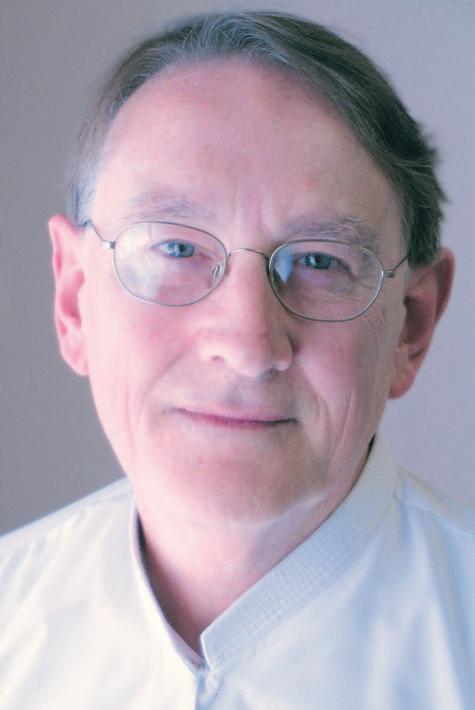
“There is no greater love for any Mother than to see her son ordained a priest of God.” Mrs Thomas.
more at the Mass you offered next day. Your Grandmother Thomas prayed for this joy for me and I realize how very truly she spoke when she told me this life could hold no greater joy for any mother than to see her son ordained a priest of God.”
After this came a great adventure for me, 23 years on the mission in the Philippine islands. Especially in the early years, physically conditions were tough, no running water, no electricity, and rice, rice, rice all the time to eat. But the rewards were great. Mission after mission in the barrios, where the people, though baptised, rarely saw a priest and were starved of the gospel and welcomed the white missioners with warmth and enthusiasm. Where there was no electricity there was no TV and so no competition for the mission; everyone turned out, flocked to confession and got their marriages blessed in droves. (Marrying 90 couples in one night was the most I ever did, though some other Redemptorists managed a lot more than that). Like in any marriage, in priesthood and religious life there can be a crisis. For me it came in 1989. In circumstances, it seems to me, of injustice and betrayal, I found myself back in Australia, deeply hurt, resentful and depressed. It was deeply painful at the time but I can see now how God used this experience to teach me many lessons and has drawn great good out of them He has made it abundantly clear that He wants me here now in my own country and has filled my life with good things.
Most of all, the love has not died. I’m still in love. It is still a joy and privilege to stand daily at the altar and say the awesome words: “This is My Body”; “This is My Blood”. It is a sacred moment when a person, nervous, hesitant, weighed down by sin, unloads their burden of guilt in the confessional, and I, acting in the person of and exercising the power of Jesus, can say the words; “l absolve you from your sins. in the name of the Father, of the Son and of the Holy Spirit.” It is my role to baptise at the beginning of a Christian life and to stand beside the bedside to comfort, bless and assist at the end of life. It is for me to proclaim the gospel of Jesus Christ day in and day out. After 56 years the widow of the man I buried lately was still in love with him. After 44 years as a Redemptorist and 38 as a priest I am still in love. What greater life could there be?
The Record 4 21 AUGUST 2003
V ocation
S tory
Traditional
Window Designs,
Art Work exhibited and sold at
Studio in Capel (200km South
details contact Marice on Ph/Fx:
Grove Road, Capel
Icons,
Other
Marice Sariola’s
of Perth) For
9727 3555, Mob 0409 107 041 26 Peppermint
PO Box 75, Capel, WA, 6271 All orders great and small welcome.
Praise the Lord

V ocation S tory
Ever since I can remember, I have always loved music and loved to sing. I still have a recordingmy dad made of me singing, I’ve got that joy, joy, joy, that I must have learnt at school when I was six years old.
Our family get-togethers usually ended up as a sing along and I would always be there tapping on something or playing bongos instead of playing with the other kids.
When I was 15, after lots of prayer and asking God what he wanted for my life, I knew in my heart that music was my vocation. When I left school, it became more evident as God started opening doors for me. Also around that time, I got to know God in a deeper way and I decided that the music I made, and the songs I wrote, would ultimately be for the glorification of God and to touch the hearts of people who don’t
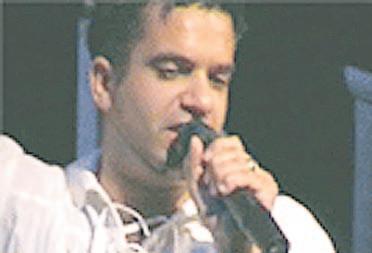
know him. A few years later, after playing the pub scene in bands around Perth, I joined Flame Ministries International as their Music Director. Their vision of evangelisation allowed me to fulfil God’s purpose for my life, and so this is where my music is now focused. Also in this capacity I am involved in youth leadership as the Moderator for the Flame Youth Ministry and have produced musicals and musical drama with FMI’s Moderator for theatre and creative arts, Damien Doherty.
In this faithfulness, God has given me many opportunities to proclaim his message through

Year of my life!
only Tuesday night) I was on the right path to an outstanding week.
On Wednesday during a lunch break someone jokingly asked me and another girl if we’d be interested in joining the Disciples Youth Mission Team. I only knew a bit about DYMT (like it was a one year commitment running retreats in schools, you live a common lifestyle, you commit to being single for the year, and you receive a small allowance).
my music, some of which have been travelling the world. I have been privileged to travel to Latin South America, Mexico, USA, England, Singapore and Malaysia. In September 2002, while on a Revival Mission with FMI’s Evangelist, Eddie Russell, I had the honour of being invited to perform my original material from a CD that I had produced called “my WORD the MESSAGE” on three live television shows from Mexico City that was broadcast to 25 million people throughout Latin South America, USA, Canada and Alaska. Through my work I can truly say I am living out my vocation. -
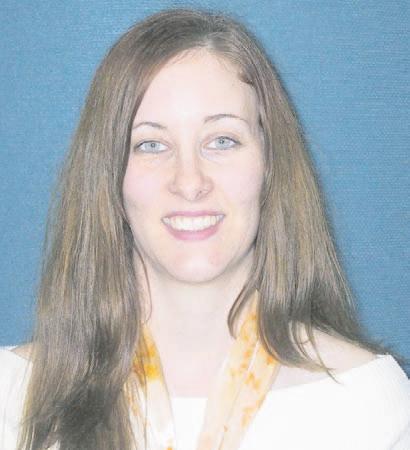
Istepped into the foyer which led to the main hall and felt surprisingly peaceful and at home. I’d just arrived at the Disciples of Jesus Summer School 2003.
After being invited to attend the School by a friend, we journeyed to Bunbury and arrived on a Sunday afternoon. The week long school was literally a life changing experience for me.
With opportunities to select lectures and seminars, attending awesome Mass celebrations, meeting beautiful people and an unforgettable Reconciliation (and all this by
I’d been living by myself for a year, had a well paid job I loved, had a pretty busy social life with lots of after-work commitments but none of this seemed too much to give up. Within the week after the I’d packed up my unit, spoken to my work, rearranged all my commitments, and moved into the DYMT girls’ household.
There have been so many unforgettable experiences this year, some hilarious, some emotional, others that are just great for building character. The six of us in DYMT are so diverse and, bringing our different life experiences with us, we make a dynamic team!
It’s such an honour to be able to serve; my own relationship with Jesus continues to grow everyday.
Patrick Carre
The only way I follow Him
by Sr Bridie Quinn
I was brought up in a strong Irish family in the West of Ireland, the oldest child in a family of eight children. I lived and accepted my Faith the same way I accepted that my parents were my parents - attending Mass and saying my prayers was like having a meal.
It wasn’t that I never thought about it, I just did it. It was an integral part of my life. Praying for missionaries and the missions was part of family prayer, so from an early age I was interested in becoming a missionary as a nurse.
In my early teenage years I met two Sisters of St John of God at the local shop and from that encounter the seeds of a call to be a Religious Sister began to grow in my spirit. Some years later with the support and blessings of my family
I entered the Sisters of St John of God in Ireland.
The day I left home for the Convent was painful for both sides; there is pain involved in any life choice.
I felt the call toward God and was leaving my family, my family felt the pain of loss and thanksgiving to God.
Two years later I was on my way to Subiaco in Western Australia where I have worked in health care as a Nurse and as a Pastoral Associate and in recent years in prison ministry.
Religious life for me is the only way I can follow Jesus and, if lived to its full potential, brings many challenges, takes me where I sometimes would rather not go, gives me times of insight and life-giving moments of fulfilment. For me, the fulfilment comes in making my commitment to God every day.
As a religious Sister I am
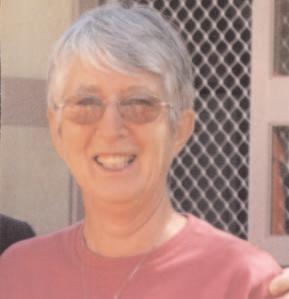
human and a real person, struggling like everyone else, enjoying friendships and relationships like everyone else.
I choose and continue to choose daily, Religious Life because it enables me to bring hope and encourages life and hope in others.
My happiness rests in responding to the call I have as a Sister of St John of God

I am a Redemptorist
To live among people, to share their gifts, to suffer with those who suffer and to rejoice in their blessings.We can share our life, and our sharing becomes a journey in which we walk together;we strive to build a more humane and loving world filled with the Spirit of God. Redemptorists in a simple way are called to radiate the love of God. Br David Hore CSsR
Maybe the Redemptorists are the answer for you.Contact us today!
Fr Hugh Thomas, CSsR, Redemptorist Monastery
190 Vincent St, North Perth Telephone:9328 6600 Email:frhughthomas@yahoo.co.uk
Our Website:www.rc.net/redempt.au

his perpetual profession,ie. life time commitment as a Redemptorist on August 29,2003.
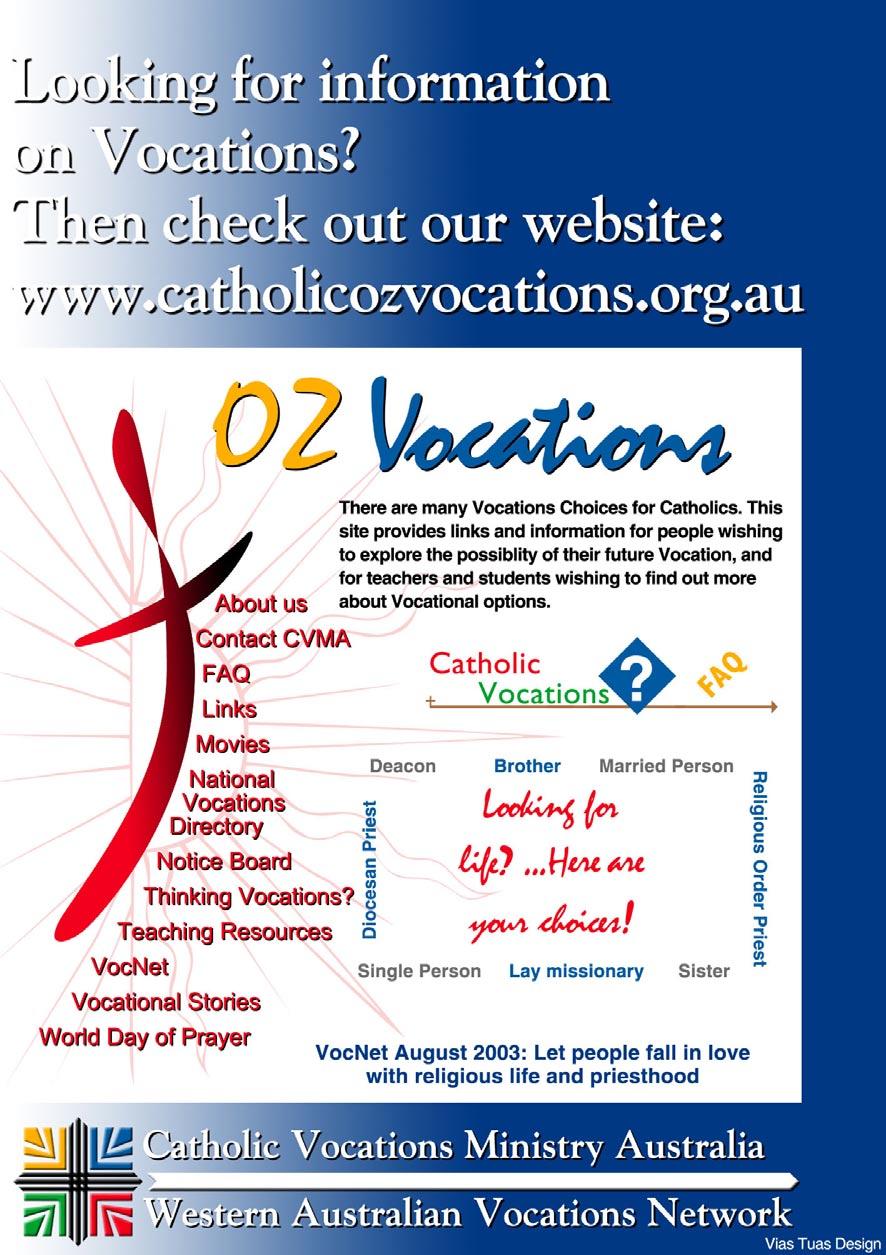
The Record 21 AUGUST 2003 5 Do your kids sleep in cold bedrooms? your kids in cold bedrooms? here is the answer... Slim-Line wall mounted ELECTRIC PANEL HEATERS Silent, safe ultralow cost solution to keeping warm this winter LESS THAN 6cPER HOUR TO RUN Ideal for bedrooms, bathroom, studies, gives great comfort to Asthma suffer’s FREE 24hr timer with every panel For more information call Econo-Heat Australia Pty Ltd on 9310 9529 or visit www.econo-heat.com
David Hore,makes
Patrick Carre
Sr Bridie Quinn
Damien Doherty
Building up a mosaic of unity
 by Stephen Hall
by Stephen Hall
Iwould like to share with you about my vocation as a focolarino, a consecrated single person in the Focolare Movement.
In 1986, I attended the Focolare holiday retreat called the
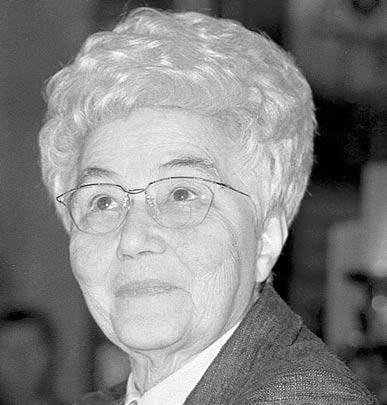
people from all different cultures sharing their faith and living together as one big family.
It was like seeing Jesus’ words, "May they all be one," being translated into life. In the young adults group we would read the "Word of Life," a phrase of the Gospel and a commentary of how it could be put into practice.
This was a real revelation to me. Jesus’ words were not just for thinking about, but were actually for living.
On one particular occasion it seemed to me like God was standing right behind me. I instinctively said, "Go away from me, I’m a sinner."
T h i s d i s c o v e r y t h a t “ G o d i s L o v e " c h a n g e d m y
l i f e . I u n d e r s t o o d t h a t w h e n w e l o v e d e a c h
o t h e r l i k e h e l o v e s u s , h e w a s p r e s e n t i n o u r m i d s t
But I felt that God had stayed and loved me.
This discovery that "God is Love" changed my life. I understood that when we loved each other like he loves us, he was present in our midst. I wanted to live like this always, and thought God might have been calling me to a life in the Focolare.
I felt that God was opening a new path for me, and asking me to be generous with him. While a little nervous about what this might mean, I also dearly wanted to say yes.
After living ten years now in the Focolare community I have to say Jesus has really been faithful to his promises. His presence satisfies my soul, inspires me to serve him, and consoles me to start again when I know I haven’t. I am happy to be a little tile in the Church, which God can use in building up the mosaic of unity, which he wishes for the world.
Keeping warm by the fire
My name is Aida Barbosa. I am a Focolarina, and the Coordinator of the Women’s movement in the Focolare.
In 1944, our Founder Chiara Lubich’s family had to leave the city of Trent, as it had been heavily bombed during World War II. She was alone and in need of a place to live.
She was offered a house, where by the end of the war she had started a growing community. People in need could find love and help there.
Chiara Lubich felt called to devote her life to God. However, not by marriage, or as a nun or living alone as a consecrated virgin. God revealed to her a fourth way which is the way of the Focolare.
The word focolarino comes from the Italian word ‘focolare’ which means fireplace.
The name conveys the warmth and sense of family that the focolarini try to foster with others.
The focolarini don’t wear a religious habit and they live collectively.
I grew up in a Catholic family in Portugal and became involved in parish youth activities. I treasured the friendships I made there.
Nevertheless, each time after
When The Great Jubilee Year of 2000 was over,John Paul II wrote an apostolic letter addressed to the whole Church – bishops,clergy and lay faithful – looking back and reflecting on what had been,by any standards,an amazing year.In Novo Millennio Ineuente (At the Beginning of the New Millennium) he offered fatherly advice on how we can all set out on the to God.


First of all, I have no hesitation in saying that all pastoral initiatives must be set in relation to holiness. Was this not the ultimate meaning of the Jubilee indulgence, as a special grace offered by Christ so that the life of every baptised person could be purified and deeply renewed? It is necessary therefore to rediscover the full practical significance of Chapter 5 of the Dogmatic Constitution on the Church Lumen Gentium, dedicated to the "universal call to holiness".
The Council Fathers laid such stress on
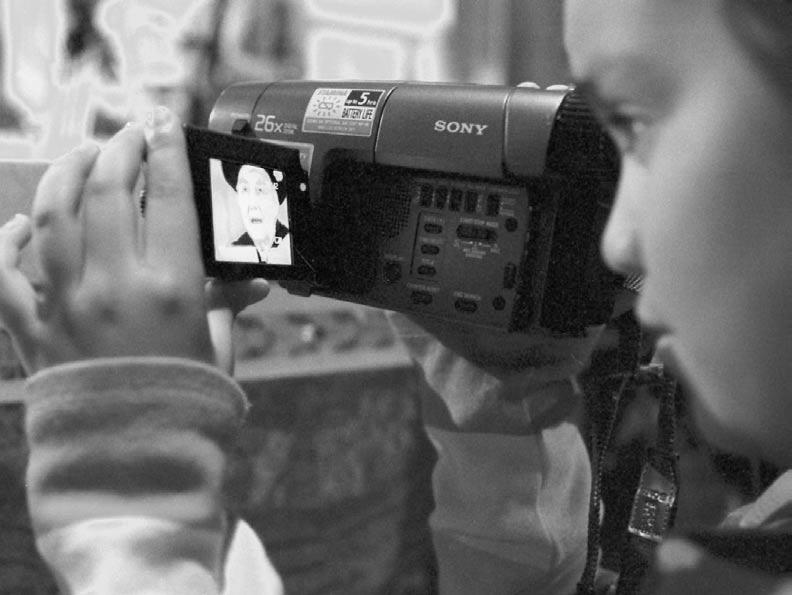
these experiences, I felt a sense of emptiness. I left the Church, but my parish priest kept in touch with me.
I was teaching in a country town when he invited me to attend a Focolare weekend for youth. I said no. He persisted for the next three years.
In that last year I got ill and the doctors gave me a choice: either go to the hospital for treatment or do it at home. I chose home.
The treatment exhausted me, I
this point, not just to embellish ecclesiology with a kind of spiritual veneer, but to make the call to holiness an intrinsic and essential aspect of their teaching on the Church.
T h e w a y s o f h o l i n e s s a r e m a n y , a c c o r d i n g t o t h e
v o c a t i o n o f e a c h i n d i v i d u a l
The rediscovery of the Church as "mystery", or as a people "gathered together by the unity of the Father, the Son and the Holy Spirit", was bound to bring with it a rediscovery of the Church's "holiness", understood in the basic sense of belonging to him who is in essence the Holy One, the "thrice Holy" (cf. Is 6:3). To profess the Church as holy means to point to her as the Bride of Christ, for whom he gave himself precisely in order to make her holy (cf. Eph 5:25-26). This as it were objective gift of holiness is offered to all the baptised.
But the gift in turn becomes a task, which must shape the whole of Christian life: "This is the will of God, your sanctification" (1 Th 4:3). It is a duty which concerns not only certain Christians: "All the Christian faithful, of whatever state or rank, are called to the fullness of the Christian life and to the perfection of charity".
To place pastoral planning under the heading of holiness is a choice filled with consequences. It implies the conviction that, since Baptism is a true entry into the holiness of God through incorporation into Christ and the
wasn’t able to go out and my friends didn’t visit me. Feeling abandoned, I prayed to God. Precisely at that time I received an invitation to attend a Focolare gathering.
I accepted it as an answer to my prayer. I now understood how the first Christians could live in our times.
For further information on Focolare, you can telephone (08) 9349 4052 or email focw.perth@focolare.org.au
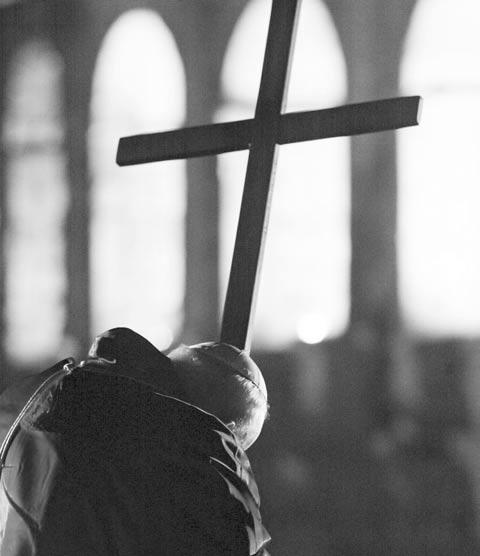
indwelling of his Spirit, it would be a contradiction to settle for a life of mediocrity, marked by a minimalist ethic and a shallow religiosity. To ask catechumens: "Do you wish to receive Baptism?" means at the same time to ask them: "Do you wish to become holy?"
As the Council itself explained, this ideal of perfection must not be misunderstood as if it involved some kind of extraordinary existence, possible only for a few "uncommon heroes" of holiness. The ways of holiness are many, according to the vocation of each individual. It is also clear however that the paths to holiness are personal and call for a genuine "training in holiness", adapted to people's needs. This training must integrate the resources offered to everyone with both the traditional forms of individual and group assistance, as well as the more recent forms of support offered in associations and movements recognised by the Church.
The Record 6 21 AUGUST 2003 320 Murray Street, Perth WA 6000 PH:9321 4224 International Hair Styling Present this advertisement to receive a 10% discount off any service provided. 200 St.George’s Terrace,Perth WA 6000 Email:admin@flightworld.com.au ® Travel Services Lic No.9TA796
Holiday FOR ALL THINGS ROMAN * Meet & Greet * Boutique Hotels * B&B * Country or City Villas * Monastery/Convent Accommodation * Theatre/Language Assistance * Restaurants * Private Car Touring Contact Michael or Sabina (08) 9322 2914
YOUR MANNING & ASSOCIATES OPTOMETRISTS Contact Lens Consultants Mark Kalnenas (B. optom) Grove Plaza, Cottesloe 9384 6720
Italian
Italian Holiday
Mariapolis. I
saw
V ocation S tory
Chiara Lubich
Elizabeth Aguilar, 9, of New York videotapes Chiara Lubich as she gives a talk following her acceptance of an honourary doctorate degree from the Catholic University of America.
You read it in The Record Make sure you don’t miss out by taking out a weekly subscription # 1 JP II’s call to holiness
Photo:CNS/Reuters
Giuliani and the goodness of God
“God made me to know him, love him and serve him here on earth and to be happy with him forever in heaven.”
That is the answer to the question “Why did God make me?” which appeared very early in the Catechism that was used to teach the Catholic Faith to children 40 and more years ago.
It is the reason for our existence and it is the vocation that all human beings share. We have different callings or vocations in many areas of our lives, but this is the vocation we have in common. It is both the meaning of our life and the source of meaning for our life.
A clear illustration of the meaning of these words was given by the former Mayor of New York, Rudy Giuliani, on ABC-TV last Monday night when he was asked by Andrew Denton about the effect of attending 200 or more funerals after the September 11, 2001 attack on the Twin Towers in New York.
Giuliani’s first and clearest response was that attending the funerals made him a more religious man. Meeting the families of the firemen, police officers and other New York City workers, many of whom he knew and many of whom he did not know, revealed to him the source of the courage, the self-sacrifice, the concern for others and the sense of duty they had shown in times of great danger. These qualities were not accidents; they had come from their homes, their families, their churches and had been passed on deliberately.
Rudy Giuliani, who himself had inspired New Yorkers, all Americans and millions around the world by the way he rose to the challenges of the time, was reminding Denton and anyone else in Australia who was listening that the qualities of courage and self-sacrifice do not come out of the blue. Firstly, they are built into us – we are made in the image and likeness of God –
and they are developed in us by those who go before us believing in these good things. Seeing so much of it in so many families made Giuliani a more religious man. We would do well to follow his example because God is all goodness and the source of our goodness whether we know it or not. We are all created to know him, love him and serve him here on earth and to be happy with him forever in heaven. We can know him at different levels, both
intellectually and personally, especially in the person of Jesus; we can love him deeply, as the saints so clearly do, or we can struggle to hold onto that love above the clamour of ego; and we can serve him in a wide variety of ways, but always in relationship with others.
Although ultimately God can be found along any pathway because he does not abandon us, it is also true that not all calls are calls from God. The late Idi Amin, for example, who died last week, is one who
Theology of the Body coming to Bunbury
Aviewing of a video of the talk by Christopher West given at the Perth CEO in March this year will be held at the Bunbury Catholic Education Office on Saturday August 30th at 2pm, 37 Winton St, Carey Park. Grant Goddard, a member of the True Love Waits movement who has studied under Professor West at Melbourne’s John Paul IIInstitute will also speak.
Organiser Jeanette Della Bona said anyone who is interested in the exciting new approach to sexuality which is the Pope’s Theology of the Body is welcome to attend. For further information contact (08) 9725 5661.
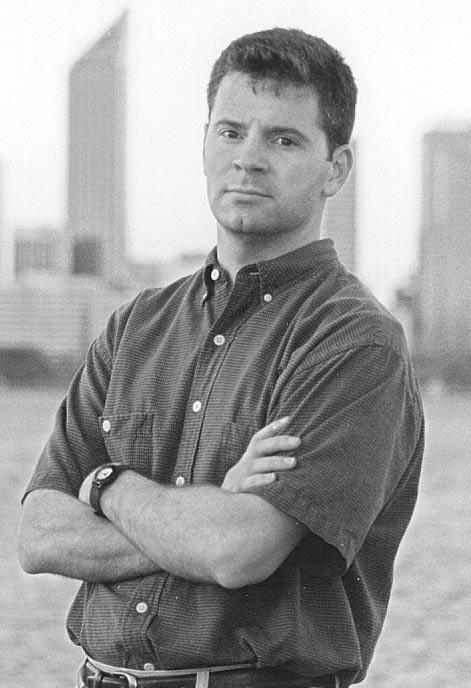

obviously got his wires crossed about the service of God and man while ruling Uganda. Our happiness and personal fulfillment depend on listening to the right voice. As Fr Stephen McGuckin, the first WA man ordained for the Missionaries of Charity, said last month before leaving to serve in India, we will not be happy unless we are doing the will of God.
For most of us, our most important call will be to marry and found a family, and then to engage in the pursuits that arise from the needs of the family and the association of families that we call society. Joseph and Mary are a good example of how important this is to the Word of God. Others will be called to stand aside from this pattern and enter a direct relationship with God in order to serve God and man through the priesthood. It is easy to forget, but impossible to exaggerate, the importance of this role. The saintly Padre Pio once said that the world could as well get along without the sun as it could without the Mass. Few of us have the depth of spiritual insight to see this truth unaided, but with his help it is clear that the salvation wrought by Jesus on the Cross and renewed each day in the Mass is the heart of humanity and life on earth. Without it, our life would be as bleak as a sunless world.
The priests of Jesus are the ones who bring this light to us. They bring us the food of eternal life in the Eucharist, Reconciliation with God, healing, instruction and the inspiration of service. Collectively, and regardless of the natural human weaknesses they also have to deal with, priests through their direct union with Jesus bring more good into the world than the rest of us put together.
That is why it is so important to encourage young men to answer this call from God, and why it is so important for us to accept the sacramental blessings that come through them.

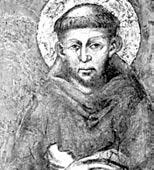


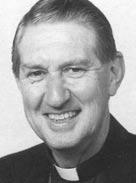
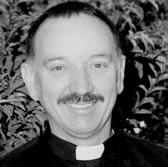
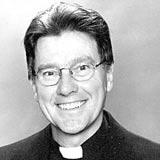
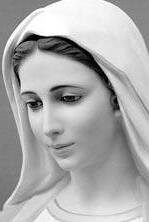
The Record 21 AUGUST 2003 7
POBox 75, Leederville, WA 6902 Tel:(08) 9227 7080, Fax: (08) 9227 7087 cathrec@iinet.net.au
Mother’s influence Plea for prayers for those on refugee protection visas


My name is John Daly. I am a 43 years old, and will be ordained a Priest on August 22 2003.
I was brought up in an IrishCatholic family, but found little time for Church or even God from my late teens to my mid-twenties.
In my late twenties I began to read the Bible each day, and even made time for prayer, but I did not make a habit of going to Church.
During this time I was working for a local machinery hire company,. However, I always had a profound sense of being unfulfilled in my life.
After much deliberation I decided to leave my job in 1990, much to the concern of family and friends, in order to travel the world.
I hoped to find what it was that could satiate the emptiness I was experiencing.
Due to an unscheduled stop in the Indian city of Calcutta (now Kolkata), I was introduced to Mother Teresa.
Almost immediately I volunteered
to work with her sisters as they cared for the poor and destitute people who virtually littered the city.
I made a promise to God that for 40 days I would go to Mass each morning, work with the sisters each day and stay for Adoration each evening...and prayed that His grace may work in my life.
My prayer was answered and for the next 7 years I divided my life between working in the streets of Calcutta and working as a field assistant in the Kimberley diamond fields in order to cover my expenses.
It was during these years in India that I started to become aware of my vocation to the Priesthood.
It did take some time for me to respond, but I returned to Perth in September of '96' to make an application to join the seminary.
It was very difficult for me to leave my work in India behind, but God was calling so loud that I was compelled to listen.
Since then I have continued my journey with Jesus, and it continues to be a fascinating journey of self discovery and fulfilment.
PRINCIPALSHIP Djarindjin-Lombadina Catholic School
Djarindjin-Lombadina Catholic School provides classes for approximately 70 Aboriginal students from Pre-primary to Year 10. The Djarindjin and Lombadina communities are located 200 kilometres north of Broome and are accessible by unsealed road. A major feature of this location is its idyllic coastal environment with lovely beaches and magically tropical sunsets.
The school serves both the Djarindjin and Lombadina communities. Lombadina has a long Catholic tradition being established as a mission in the early 1900’s. Although it was the St John of God Sisters who founded the school in 1913, there have been a number of religious orders associatedwith the school over the years and a lay principal and teachers now staff the school. Local Aboriginal Teaching Assistants provide invaluable supportwithin the school and are a strong link to the communities.
The successful applicant will commence on 1 January 2004.
Applicants need to be actively involved in the Catholic Church and be experienced educators committed to the objectives and ethos of Catholic education. They will have the requisite theological, educational, pastoral and administrative competencies together with an appropriate four year minimum tertiary qualification and will have completed Accreditation B or its equivalent.
A current Police Clearance/100 Point Identification Check must also be included. A Police Clearance Consent Form is available from the Department of Education and Training website (www.eddept. wa.edu.au/HRRecruitment/Downloads/PoliceClearance.pdf).
Official application forms are available from Martin Loney, Consultant, Leadership Team, on (08) 9212 9268 or Email: loney.martin@cathednet.wa.edu.au Applications are to be addressed to The Director, Catholic Education Office of WA, PO Box 198, Leederville WA 6903 and be lodged no later than Friday 5 September 2003. Website: www.ceo.wa.edu.au
Adelaide’s Aboriginal Catholic Ministry has had contact with more than 500 Afghan refugees in the last two years and has issued a nationwide request for prayers for those on temporary protection visas.
As the special edition of The Record focussing on vocation was being prepared for print early this week the paper received an email call for help in the form of prayer for refugees from the Aboriginal Catholic Ministry in Adelaide.
"We are a small Aboriginal Catholic Community in Adelaide, South Australia," said the email from Shirley Peisley AM, the Director of ACM in Adelaide and coworker Barbara Falla.
"We are making a simple request of you, for prayers."
"We are asking for prayers for Temporary Protection Visa refugees from religious people and groups across Australia."
"We are asking people and communities to pray for all Temporary Protection Visa holders in Australia both on Migrant and Refugee Sunday and throughout the coming year.
"Pray that our government
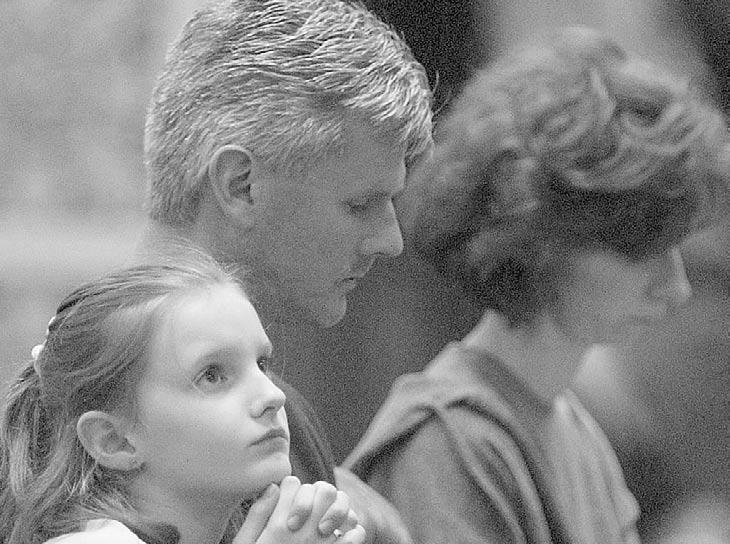
has a change of heart; pray that all Australians will develop a better understanding of their situation. Pray that Temporary Protection Visa holders will be recognised and welcomed in Australia for what they are: ordinary people forced to leave home and take refuge in a strange country."
With Migrant and Refugee Sunday due to be observed on August 31 the pair said that over the past two years Adelaide’s ACM has had contact with more than 500
Speaking to God # 2
This training in holiness calls for a Christian life distinguished above all in the art of prayer. But we well know that prayer cannot be taken for granted.
We have to learn to pray: as it were learning this art ever anew from the lips of the Divine Master himself, like the first disciples: "Lord, teach us to pray!" (Lk 11:1).
H o w h e l p f u l i t w o u l d
b e i f n o t o n l y i n r e l i g i o u s c o m m u n i t i e s
b u t a l s o i n p a r i s h e s m o r e w e r e d o n e t o
e n s u r e a n a l l - p e r v a d i n g c l i m a t e o f p r a y e r .
Prayer develops that conversation with Christ which makes us his intimate friends: "Abide in me and I in you" (Jn 15:4). This reciprocity is the very substance and soul of the Christian life, and the condition of all true pastoral life.
Wrought in us by the Holy Spirit, this reciprocity opens us, through Christ and in Christ, to contemplation of the Father's face. Learning this Trinitarian shape of Christian prayer and living it fully, above all in the liturgy, the summit and source of the Church's life, but also in personal experience, is the secret of a truly vital Christianity, which has no reason to fear the future, because it returns continually to the sources and finds in them new life.
Is it not one of the "signs of the times" that in today's world, despite widespread secularisation, there is a widespread demand for spirituality, a demand which expresses itself in large part as a renewed need for prayer?
It is a journey totally sustained by grace, which nonetheless demands an
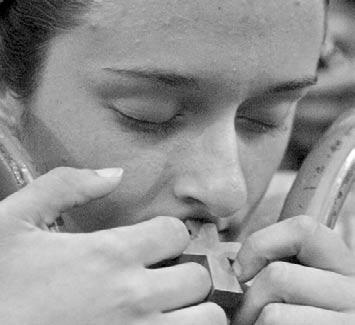
intense spiritual commitment and is no stranger to painful purifications (the "dark night").
How can we forget here, among the many shining examples, the teachings of Saint John of the Cross and Saint Teresa of Avila?
Yes, dear brothers and sisters, our Christian communities must become genuine "schools" of prayer, where the meeting with Christ is expressed not just in imploring help but also in thanksgiving, praise, adoration, contemplation, listening and ardent devotion, until the heart truly "falls in love".
Intense prayer, yes, but it does not distract us from our commitment to history: by opening our heart to the love of God it also opens it to the love of our brothers and sisters, and makes
Afghani refugees. They are ordinary children, women and men who have come to Australia by boat. They have spent time behind razor wire in a detention centre in the desert.
They have been recognised as "real refugees" but released with only a 3-year Temporary Protection Visa, a Centrelink benefit and no support to resettle in the community."
Most of the Afghanis are Hazara people, an ethnic minority group in Afghanistan, they said.
us capable of shaping history according to God's plan. Christians who have received the gift of a vocation to the specially consecrated life are of course called to prayer in a particular way: of its nature, their consecration makes them more open to the experience of contemplation, and it is important that they should cultivate it with special care. But it would be wrong to think that ordinary Christians can be content with a shallow prayer that is unable to fill their whole life.
Especially in the face of the many trials to which today's world subjects faith, they would be not only mediocre Christians but "Christians at risk".
It is essential that education in prayer should become in some way a key-point of all pastoral planning.
How helpful it would be if not only in religious communities but also in parishes more were done to ensure an all-pervading climate of prayer. With proper discernment, this would require that popular piety be given its proper place, and that people be educated especially in liturgical prayer. Perhaps it is more thinkable than we usually presume for the average day of a Christian community to combine the many forms of pastoral life and witness in the world with the celebration of the Eucharist and even the recitation of Lauds and Vespers. The experience of many committed Christian groups, also those made up largely of lay people, is proof of this.
The Record 8 21 AUGUST 2003
V ocation S tory
Adelaide’s Aboriginals Catholic Ministry is calling for prayers for Afghan refugees
Photo:CNS/Reuters
John Daly
What is holiness?
By Bishop Don Sproxton
Ionce heard someone remark that they felt uncomfortable in the presence of a holy person. It is a remark that has intrigued me ever since.
"The holy person" conjures up many images. Some images are certainly good and true, while others are quite wrong and misleading. I have been fortunate enough to have been in the presence of some really amazing people who are full of faith and at the same time are fully human.
Holiness, it seems to me, is a state of growing and becoming. On this side of the grave, I do not think anyone would be content with the stage of the spiritual journey at which they are currently. We would be conscious of so much more that needs to be done within us, not the least of which would be our trust in the Providence of God and the need for complete conversion of heart, mind and will to God.
The solid foundations of Holiness are belief in Divine Providence and conversion. Belief in the Providence of God demands that the Christian recognises the difference between God and ourselves. Jesus both taught and demonstrated in his own life that God is the truest of Fathers. God is powerful, wise and faultlessly loving. There is nothing the wise Father is not prepared to give, as long as it is not harmful to us or delays our growth into the full stature of Christ.
The careful way in which the Father blesses us in our lives displays the wisdom of God. Certainly we are not always able to recognise a blessing, and sometimes it takes many years to truly see the point of some event, of understanding what God was trying to get us to see in ourselves.
I have seen in my own life and in the lives of a good many people that Providence is real and very wise. What is important for God is that we should become holy; that there should be the eventual integration of our person so that nothing will obscure the image of God, Jesus Christ, from being seen in us. God wants the "work in progress" of our person and life to reach the perfection it was intended to achieve.
For Providence to work we need to grow in humility. It is essential that each of us clearly understands our place in the scheme of things. Humility will show us the difference between God and the human person, between the Creator and the creature. It helps us to acknowledge our limitations.
Whenever I think of Providence in this way, I have to immediately consider the idea of Conversion. The Book of Genesis, the accounts of how and why we are the way we are, pretty clearly teaches us about the wound that we all carry
# 3
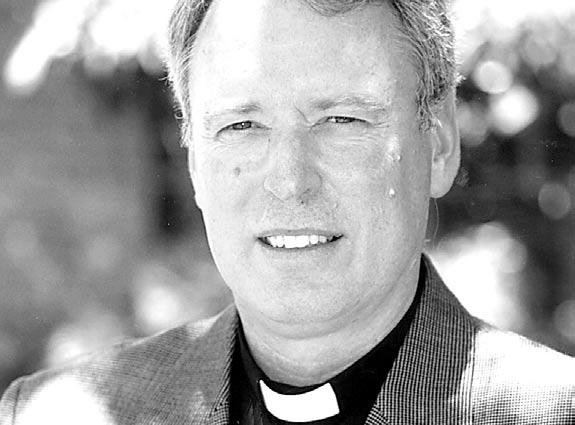
Iand why conversion is essential. It is because we are full of pride. The sinful wound of pride caused humanity from the very first to be alienated from God, others and even from ourselves. Pride sought to unseat God and replace the True God with a god of our own making and in our own image.
Holiness is about being recreated. Some would say it is about becoming fully integrated as a person which is certainly part of the process and a desired outcome.
When we adopt the process of becoming holy or whole, there will be changes in us that will become evident to others and ourselves. Gradually through prayer, reflection on our lives and conversion, the image of Christ will become visible in us.
It is at the time we celebrate the Sacrament of Confirmation that we reflect on the so called Fruits of the Holy Spirit. In Galatians 5:22-23 we read about the nine Fruits of the Holy Spirit or nine ways in which we can be changed. A helpful way of understanding the way to holiness, where the Holy Spirit may work within us, is to reflect on where we might be at the moment. So in the light of the Fruits of the Holy Spirit if we experience a deep selfishness, an openness to the Holy Spirit can produce love growing in our hearts; to a deep unhappiness, joy can be produced; to inner conflict and stress, peace; to restlessness, patience; to indifference, kindness; to human weakness, goodness; to dishonesty, truthfulness; to harshness, gentleness; to unruly emotions and the inner forces that weaken the ability to choose, self-control.
Obviously, a spiritual guide is necessary for the openness to the Holy Spirit to develop and for the practice of these virtues to continue. But holiness will be achieved by the grace provided by God and these fruits gradually being produced in our lives. Then the true image of God will appear in us.
The Sunday Eucharist
t is therefore obvious that our principal attention must be given to the liturgy, "the summit towards which the Church's action tends and at the same time the source from which comes all her strength".
In the twentieth century, especially since the Council, there has been a great development in the way the Christian community celebrates the Sacraments, especially the Eucharist.
It is necessary to continue in this direction, and to stress particularly the Sunday Eucharist and Sunday itself experienced as a special day of faith, the day of the Risen Lord and of the gift of the Spirit, the true weekly Easter.
For two thousand years, Christian time has been measured by the memory of that "first day of the week" (Mk 16:2,9; Lk 24:1; Jn 20:1), when the Risen Christ gave the Apostles the gift of peace and of the Spirit (cf. Jn 20:19-23).
The truth of Christ's Resurrection is the original fact upon which Christian faith is based (cf. 1 Cor 15:14), an event set at the centre of the mystery of time, prefiguring the last day when Christ will return in glory.
We do not know what the new millennium has in store for us, but we are certain that it is safe in the hands of Christ, the "King of kings and Lord of
lords" (Rev 19:16); and precisely by celebrating his Passover not just once a year but every Sunday, the Church will continue to show to every generation "the true fulcrum of history, to which the mystery of the world's origin and its final destiny leads".
Following Dies Domini, I therefore wish to insist that sharing in the Eucharist should really be the heart of Sunday for every baptised person. It is a fundamental duty, to be fulfilled not just in order to observe a precept but as something felt as essential to a truly informed and consistent Christian life. We are entering a millennium which already shows signs of being marked by a profound interweaving of cultures and religions, even in countries which have been Christian for many centuries.
In many regions Christians are, or are becoming, a "little flock" (Lk 12:32).
This presents them with the challenge, often in isolated and difficult situations, to bear stronger witness to the distinguishing elements of their own identity.
The duty to take part in the Eucharist every Sunday is one of these. The Sunday Eucharist which every week gathers Christians together as God's family round the table of the Word and the Bread of Life, is also the most natural antidote to dispersion.
“A sense of vocation counters a tendency to drift through life,to experiment but not to commit.”
DEPUTY DIRECTOR CATHOLIC EDUCATION WESTERN AUSTRALIA
The Director of Catholic Education Western Australia invites applications from committed practising Catholics with appropriate qualifications and leadership experience for the position of Deputy Director, to commence January 2004.
• The Deputy Director, together with the Executive Management
Team of the Catholic Education Office, is responsible for the effectiveness of the strategic management of the Catholic Education Office.
• The Deputy Director will have the ability to deputise for the Director, liaising with the Church, government and education bodies at a State and Federal level.
• The successful applicant will be an experienced educator with a thorough knowledge of the contemporary Church and able to demonstrate recent commitment of teamwork, accountability and quality religious and secular education standards.
• The successful applicant will have an ability to enable others and have the necessary personal qualities which include sound judgement and well developed skills of communication.

• The main duties and responsibilities of this position will be further developed to include the experience and expertise of the successful applicant.
Recognised commitment to the objectives and ethos of Catholic education is essential to this position.
Further information and the official application package can be obtained from Jeanne Harper, Executive Assistant (08) 9212 9202; email: harper.jeanne@cathednet.wa.edu.au
All applications, on the official form, should reach The Director, Catholic Education Office of WA, PO Box 198, Leederville 6903 no later than Friday 5 September 2003. Website: www.ceo.wa.edu.au
PRINCIPALSHIPS Kearnan College, Manjimup
Kearnan College, situated in Manjimup, some 300 kilometressouth of Perth, is a Catholic co-educational College catering for students from Kindergarten to Year 12. The primary enrolment is currently 174, while the secondary enrolment is 78.
The College was founded by the Sisters of St Joseph of the Sacred Heart in 1923 and named after the first Parish Priest, Father Francis Kearnan. The College motto of Seek Truth with the Cross for Faith, the Dove for all the gifts of the Spirit, and the Circle of Wholeness, signifies the belief that the way of finding truth is the way of God. The College enjoys good facilities, and the continuous upgrading of the buildings and grounds is a priority of the College Board. While the primary and secondary components are on the same campus, a separate Technology and Design facility is used. The College also has a small farm to provide Agricultural education.
St Bernadette’s Catholic Primary School, Port Kennedy
Saint Bernadette’s Catholic Primary School is a K-7 double stream co-educational primary school with an enrolment of 458 students. Situated in Port Kennedy, 65 kilometres from Perth, the school has become an integral part of the local Catholic community since its establishment in 1994.
As well as close ties between parish and school, the strong sense of community is evident in the existence of an active School Board, an enthusiastic Parents and Friends’ Association and many volunteer programs for parents.
St Bernadette’s has an educational focus on Information Technology and Middle Schooling. Volunteers in Special Education and parental classroom support are additional noteworthy aspects of the school’s educational life.
The school has been in a building phase since 1994 and all building programs are expected to be completed by 2004.
The successful applicants will take up these positions on 1 January 2004. Applicants need to be actively involved in the Catholic Church and be experienced educators committed to the objectives and ethos of Catholic education.They will have the requisite theological, educational, pastoral and administrative competencies together with an appropriate four-year minimum tertiary qualification and will have completed Accreditation B or its equivalent.
A current Police Clearance/100 Point Identification Check must also be included. A Police Clearance Consent Form is available from the Department of Education and Training website (www.eddept.wa.edu.au/ HRRecruitment/Downloads/PoliceClearance.pdf Official application forms are available from Martin Loney, Consultant, Leadership Team, on 9212 9268 or Email: loney.martin@cathednet.wa.edu.au
Applications are to be addressed to The Director, Catholic Education Office of WA, PO Box 198, Leederville WA 6903 and be lodged no later than Friday 12 September 2003.
Website: www.ceo.wa.edu.au
The Record 21 AUGUST 2003 9
Bishop Sproxton
The family is wh vocations begin
The Family: Seedbed of
 by Father John McCloskey
by Father John McCloskey
e know that the core teaching of the Second Vatican Council is the radical call of all to holiness. However, we also know that God calls a chosen few, that should be many, to follow him even more closely in a life of apostolic celibacy for the kingdom of God, whether it be as a priest, religious, or layperson.
The founder of Opus Dei once emarked that those called by God e ninety percent of their vocation their parents. The family is the seedbed of vocations.
Saint John Bosco was reported as saying that one out of every ten Catholic men has a ocation to the priesthood. We could say that he employed the word men in the inclusive sense and say that one out of ery ten persons has a specific supernatul calling from God.
erhaps this is the Lord’s way of assuring a tal tithing of his children. He has no interest in money but has a total commitment to his children as a loving Father.
N o w a d a y s , i t i s m o r e a n d m o r e r e c o g n i s e d t t h e v o c a t i o n t o a p o sy f o r t h e k i n g d o m o f a v i a b l e c h o i c e f o r t h e n d e e d , t h e C h u r c h h a s e c l e a r t h r o u g h i t s a s t i c e n d o r s e m e n t o f e d a n d e f f i c a c y o f s p eo c a t i o n s t o t h e v a r i o u s m e n t s a n d i n s t i t u t i o n s o f h u r c h t h a t a r e l a y - o r i -

One of the greatest hopes of any Catholic amily should be to have one, or more, of their children to be chosen in a special y by God for his service. Traditionally, this has meant a vocation to the diocesan priesthood or one of the religious congre-
In a specific sense we are referring to the priesthood, the religious life, or to one of the various movements and institutions for laypeople that enable them to dedicate themselves tally to God in the middle of the orld. These new institutions are highly favoured by the Church as a means of complete dedication to the apostolate.
Nowadays, it is more and more recognised that the vocation to apostolic celibacy for the kingdom of God is also a viable choice for the layperson. Indeed, the Church has made it quite clear through its enthusiastic endorsement of the need and efficacy of specif-
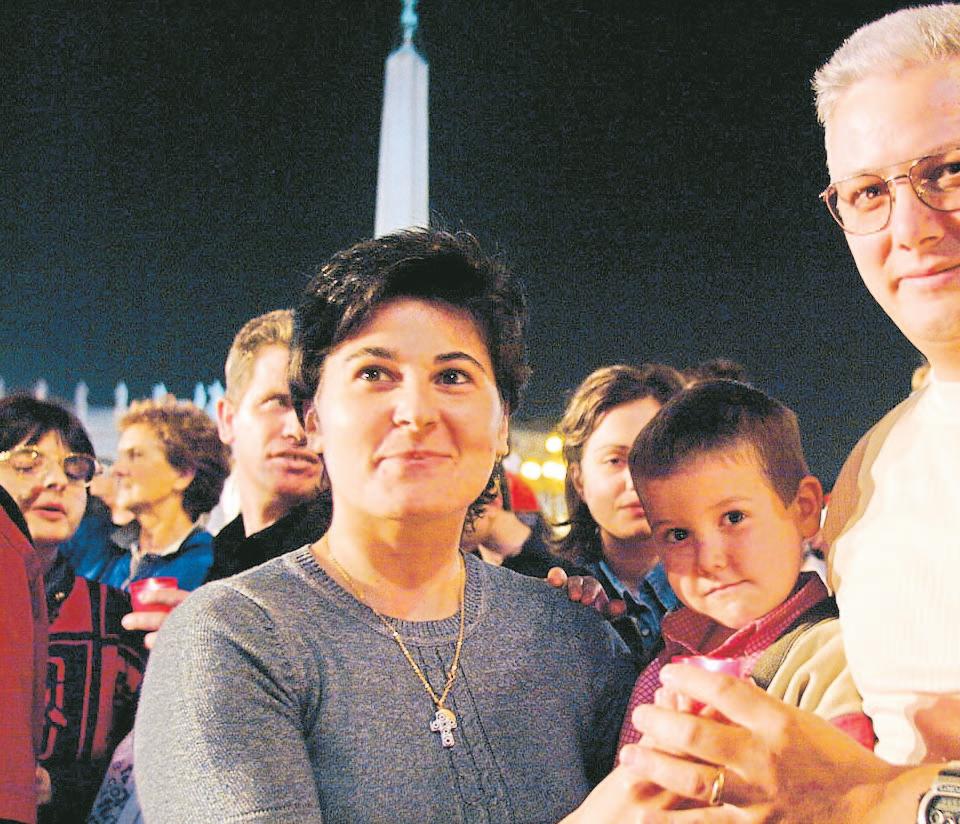
ic vocations to the various movements and institutions of the Church that are lay-oriented.
However, it is no secret that generally, with some few notable exceptions in some few dioceses and religious congregations, vocations have been in sharp decline in Europe and North America over the last forty years while on a steady but unspectacular rise throughout the rest of the world during the pontificate of John Paul II.
There are a variety of reasons for this decline in the West. We could cite contraception producing smaller families, general affluence resulting in the bourgeois spirit producing a consequent lack of generosity, lack of catechesis, the general confusion in the Church, the sexual revolution and the consequent loss of innocence resulting in cynicism and hedonism among young people where ideals should be high, the sad example of tens of thousands of married couples and priests and religious who have not been faithful to their commitments to God and the Church, and each other.
However, the example of holiness is a much more powerful influence on young people if they are brought up in such a way as to appreciate it. Witness the impact of John Paul II, Mother Teresa, the new Doctor of the Church Saint Therese of Lisieux, Blessed Josemaria Escriva, the founder of Opus Dei and so many others. Look at the World Youth Days in Czestochowa, Denver, Paris and Toronto with their
millions of young people united in prayer and sacrifice, and apostolic zeal with the Holy Father and the Church.
The family atmosphere in which vocations are bred, nourished, and readied for fruition really is no different than what any serious Catholic parents would want to create for their children in order to prepare them for holy marriages and to give a Christian witness in the world. As the noted family expert Jim Stenson has remarked, parents should form their children with their vision pointed into the not too-distant future when their children will marry and have children of their own. They are preparing their children to be responsible, faithful adult Catholics and family persons who will build up the Church, society, and culture.
Catholic parents who want to produce vocations for the Church have to be ready to be heroically counter cultural. As the old Beatles song put it, "It don’t come easy." Putting it mildly, the world appears designed at the moment to thwart people, particularly young people, from even entertaining the thought of complete dedication to God. I like to speak of three particularly strong influences on young people today.
One, the general culture; two, the educational system; three, the family environment. Hopefully, at least two out of three would be positive influences to create a favourable environment for young men and women to commit themselves totally to God.
The Record 10 21 AUGUST 2003
Families attend a special celebration with Pope John Paul II on October 20, 2001 in St Peter's Square. The event was held in conj letter on the family.
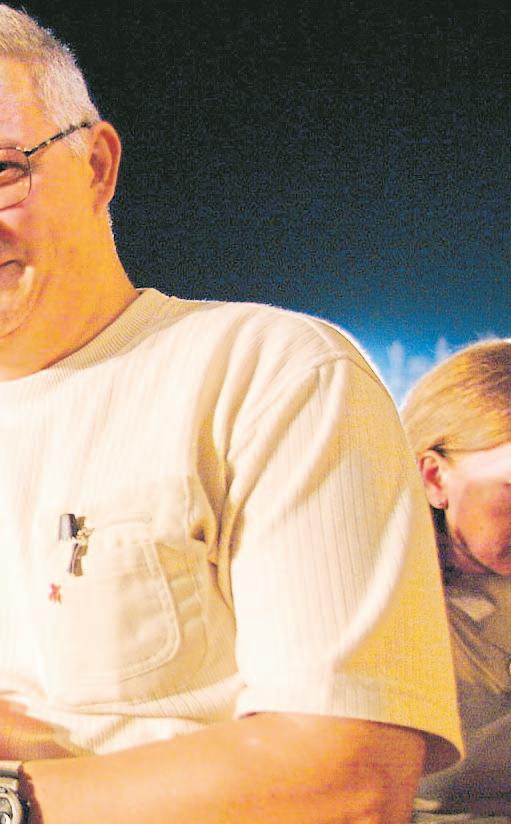
Unfortunately this is not the case. The secular educational system, from top to bottom, as presently constituted, represents the ideology of secular humanism as the norm; the general culture appears designed by a demonic Intelligence to destroy any notion of beauty or truth in any young mind or heart.
This leaves the family which is under unprecedented attack by the aforementioned forces and others, apparently left alone to fend for itself.
However, the reigning Pontiff John Paul II tells us that us the future passes through the family. I, with him, bet on the family. It has a long track record of survival. Be sure to read his Letter to Families for some hopeful and helpful advice.
Father John McCloskey, STD is a priest of the Prelature of Opus Dei and is the Director of the Catholic Information Centre of the Archdiocese of Washington. Father John's articles and reviews have been published in major Catholic and secular periodicals, including Catholic World Report , Crisis Magazine , The Wall Street Journal , National Catholic Register , Washington Times, the New York Times, and ACEPRENSA
He received a degree in Economics from Columbia University in 1975. After working professionally on Wall Street, he studied in Rome and Spain where he received his doctorate in Theology with a specialty in Church History. He was ordained in 1981 in Spain by Cardinal Roger Etchegaray and has spent much of his time counselling university students and fellow priests.
Creating the right environment
What can parents to do to create an environment where one or some of their children will discern a specific call from God to follow him completely?
They should want to foster a family life where it is natural to be generous, to make a sincere gift of oneself to others. Here a few ideas:
1. Parents must be their children’s best friends.
To win and keep children’s friendship is a daunting but joyful task. You must show your trust for them and respect for their freedom from an early age trusting that the Holy Spirit is already at work in their soul from Baptism.
You may sometimes be disappointed but your children will realise that your love is unconditional. Y o u r c h i l d r e n s h o u l d k n o w t h a t y o u p r a y f o r t h e m e v e r y d a y , t h a t t h e y b e h o l y a n d h a p p y a n d g e n e r o u s t o w h a t e v e r G o d c a l l s t h e m .
Speak often positively about the Church and the greatness of being called to a life of dedication in it. Never speak negatively about persons who have dedicated their lives to God no matter what their human failings might be.
Your children should know that you pray for them every day, that they be holy and happy and generous to whatever God calls them.
They must know that while you are concerned with their education, health, achievements, career prospects, these are all secondary to their being virtuous and happy in this life and saved in the next.
2. Foster a simple life of piety in the home adjusted to the condition and ages of the children.
It should leave the children asking for more, not begging for less. The Cure of Ars was once asked by parents what they could best do for their children. He said simply to bring them frequently to Jesus in the Eucharist and in the Sacrament of Penance
. Figure out how you can do this respecting their freedom yet making it attractive.
What is most important is their seeing you lead a more devout life than they. They will watch you pray, go to Mass, go to confession, read the Sacred Scripture, pray the Rosary, and so on.
They will see that the liturgical calendar is the most important one for their family and that you celebrate accordingly. They will also see you make sacrifices in order to do so. Pleasing God, not men, will thus become the priority in their life also.
3. Teach them to value poverty and detachment.
Keep them short on money. Do not let them indiscriminately acquire things or measure people by the amount of their possessions. Teach them to make things last and how to go without happily.
Teach them how to share cheerfully. Make sure they spend their summers productively. That often will mean they work and/or spend time in generously serving others less fortunate than themselves.
Expose them according to their age and ability to "take it," to misery. Soup kitchens, nursing homes, and hospital for incurables including for children should be places where, over time, they feel comfortable.
One of the most effective ways to assure this quality of generosity is simply to have a large family and to treasure the children God has sent to you.
This will help them to place the person and not the pleasure or object at the heart of their moral universe. The greatest gift you can give to your children is more brothers and sisters. Persons are not things. Thus too they will never see another person as a means or an object but rather as another Christ whom it is their privilege to serve.
4. Instill an appreciation of beauty, whether it be in nature, literature, music, or art.

The books, magazines, compact discs, videos, musical instruments, and art that you have in your house, the television shows that you watch together, and the family excursions that you take will prepare them to appreciate the goodness of the material world that God has created and redeemed. They will also understand and despise by contrast the culture of death, which kills both the body and the soul. Beware of leaving your children alone with the television or computer, particularly as regards games and the Internet. They should be considered as dangerous substances easily subject to abuse and thus closely supervised and controlled. All of this will prepare them, as they mature, to be more reflective, and contemplative thus more able to wisely discern and answer God’s call.
5. Take special care with their formation outside the house.
Encourage them to have a wide variety of friends with whom they can share the joy of your own family life. By the time they graduate from high school they simply must have an excellent grasp of Catholic teaching in its doctrine and morality and be able to give an account to others of the hope that is within them. This is your primary responsibility. Every family has different financial circumstances and choices. It may be home schooling, the parochial or private school, or even the public school. It is not simply a question of choice, however. Christian parents have a serious responsibility to improve all varieties of education, always insisting on the primary responsibility of parents for their children’s education. If need be, you may have to teach them the Faith yourselves but in any case you must not send them off to college as innocent lambs ready for the slaughter. Believe me, there are plenty of wolves out there. Introduce them to the saints as their role models while also encouraging them to imitate the virtues of the great men and women of history.
Remember you are preparing them for a life of service and dedication to God and not necessarily in the convent, monastery, or rectory. You may also want to encourage them, gently, to participate in Catholic programs for youth that are sound, demanding, and fun. It may be there that they first come in contact with those other mentors and new friends who will introduce them more concretely to the possibility of a life of total dedication.
These are just a few ideas. You yourselves will have others. Nobody knows your children better than you do or loves them more save God Himself. Vocations are a supply-side phenomenon. Supply creates demand.
If you supply (offer) your children to God through your prayer and careful preparation, He will match you by taking them through His grace and their collaboration. Don’t forget the shortcut of entrusting them to Mary, the Mother of God.
If our Lady takes a special liking to them, her Son will form them into the new evangelisers of the third millennium. You will lift a hymn of thanksgiving to God for rewarding your generosity by calling one of yours to be a special one of His. And if your children don’t receive a divine vocation which is unlikely if you follow the advice given above? Don’t worry, your grandchildren will. You cannot outdo God in generosity.
First appeared in Position Papers (Ireland)
The Record 21 AUGUST 2003 11
here
junction with the 20th anniversary of Familiaris Consortio, the Pope's
Photo:CNS/Catholic Press

When 21-year-old John Rogers met 17-year-old Mary Roebuck in a physics class at Wolverhampton Technical College 54 years ago, he knew there was something special about her.
After four years of friendship and 50 years of marriage, he is unshaken in that assessment: “I knew there was something special about her from seeing her the very first time,” he said after they celebrated their golden wedding anniversary by renewing their wedding pledge to one another during the evening Mass at St Simon Peter Parish last Friday, on August 15. A Papal blessing reinforced the ceremony.
As well as being their wedding anniversary, it was, said Mary, also the anniversary of the first time John went into a Catholic Church.
A few months after their first meeting, John and Mary started going out together as they continued their studies and began their careers, he as an engineer in power generation and she as a teacher. One of
their regular outings saw John sitting quietly in the corner of the choir loft at Our Lady of Perpetual Succour Church in Wolverhampton for the Sunday morning 11am sung Mass (in Latin). Mary was in the choir and her father was organist and choirmaster.
“Fortunately, music was one of the many shared interests that have been part of the joy of our marriage,” John said.
Although a “Christmas-time” Anglican, John had no antipathy to religion or the Church. His grandfather and his father had built organs for churches and an uncle was an organ tuner, so the church was a natural part of life.
He enjoyed his long chats with the priest in the country parish where he lived and became a Catholic almost two years before he and Mary married in her home church.
Married in 1953, the couple had four children before deciding to move to Western Australia in February 1969. The motivation was a better life for their children, and they have no regrets about the move.

Ω π ∑
John came out to a job with the State Electricity Commission (now Western Power) at the new power station at Muja in Collie, and Mary soon found work at the Amaroo and Wilson Park primary schools
in the town.
Two years later John moved to Bunbury power station, with Mary teaching at Withers and Carey Park, and then to South Fremantle power station until it closed in 1978 (with Mary teaching at Safety Bay). John retired from Western Power in 1988 and Mary completed her teaching career lecturing in maths and computer educa-
Truly a call from God
From physics to family... # 4

My name is Milton Arias. I come from Colombia, am 27 years old and the only child from a Catholic family. I was ordained to the Diaconate on July 11 this year and I have completed my formation and studies here in Perth.
Since I was little, I thought that my vocation was to look after my parents. As I started to grow I discovered that this situation was affecting me a lot because I was a very insecure person who struggled even to make the smallest decision.
I remember how my friends used to make fun of me because I was never allowed to go out for parties and this really made me suffer.
In those years I could not be bothered about vocation because my parents were giving me whatever they could so I felt I needed nothing from anyone. At this moment too my head was full of projects of becoming someone.
This is when I decided to study medicine but it meant moving out into another city and I really did not want to be away from my house so I gave it a miss.
Afterwards I began my studies as a Mechanical Engineer so that I could become involved in the racing car business but I had to study it in another country so this plan was also shattered.
After these two failures I was a bit angry with myself and I decided to work and enjoy life.
It was at this point that my mother invited me to listen to some adult catechesis of the Neocatechumenal Way given in my parish and I went, just to placate her, because every year she would invite me and I would give her the same answer “may be next year.”
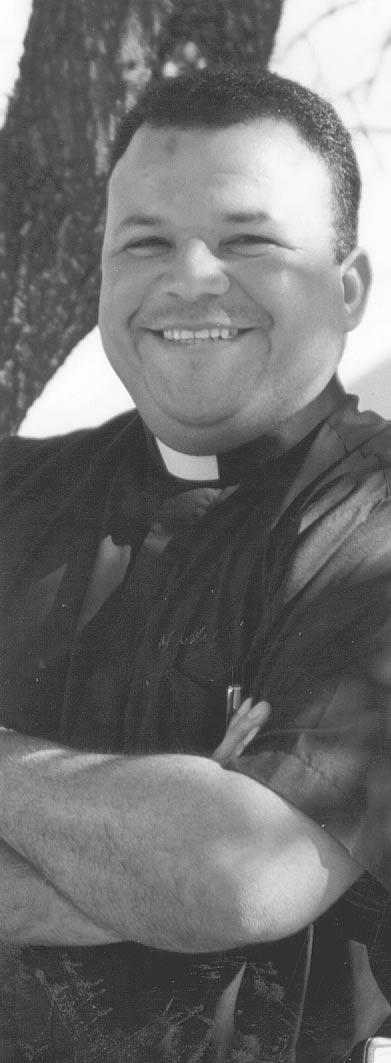
For me this was like a wake up call that Christ sent to me because I was starting to make a mess of my life. In that catechesis, too, I saw the Church as a mother who came to offer me a possibility to experience real life and not the dreams I had in mind. This was manifested in a community formed with a different kind of people who I had not previously met but who made me feel welcomed and where I was able to sense the risen Christ speaking to each one of us.
After a few years walking with this community, I began to think seriously about marriage. In fact,
there were some girls in that community who told me I was not their type to marry. It is amazing to see how God has a funny sense of humour because I never thought of becoming a priest.
Even the fact of thinking about it made me laugh. Then I had my own excuse, I am an only child so, humanly speaking, I could not become a priest. In 1992 coming back from work, I was invited to the World Youth Day meeting in Denver with the Pope but I did not attend. Later in the same year there was a meeting with all the young people in my country and there I heard a priest saying that when God calls there is no way to escape his call.
This was the starting point of my vocation to the priesthood. I must say I had millions of doubts about my vocation (you can ask my Rector about them) but those doubts helped me realise that this was truly a call from God and not just another idea I had in my mind.
Also I have seen that really God had that particular plan for me and most of all, he has given me the possibility to be happy doing his will.
I have seen also the blessings I have received and I am a witness too that what Christ says in the Gospel about leaving everything behind and following him is true because when I left home, I thought that was going to be the end of the world.
But I discovered that God did not cheat me because he has rewarded me by learning to speak English and also to live surrounded by families who have opened their homes to welcome me and made me feel I am not alone. Finally I can say that God has been really good with me because I have seen how he has provided for my family, the seminary, this Archdiocese and also me.
tion at Edith Cowan University from 1985 to 1992. While in WA they produced two more children and adopted a third, and the family has now been enlarged by 15 grand children, although one son and his three children now live in New Zealand.
The family have lived in the northern suburbs for 16 years, and for the last five have been in St Simon Peter Parish, Ocean Reef. Mary is currently in her third year on the Parish Council and on the St Simon Peter Primary School Board.
Mary said that having their family spread over 20 years was a highlight because there were children in the home for a long period and the children grew into a very loving and tight-knit family.
“The joy and love of marriage are the foundation for the family,” she said. “There are lots of ups and downs (including the loss of their first son early in his life) but if you love one another and there is give and take you come through it all.”
John didn’t offer the secret of a long and happy marriage, but said “You have to have the same values and be aiming in the same direction. Similar interests and aspirations count for a lot.
“Family keeps life going, but it isn’t just that; there’s something more in marriage.”
The Sacrament of Reconciliation
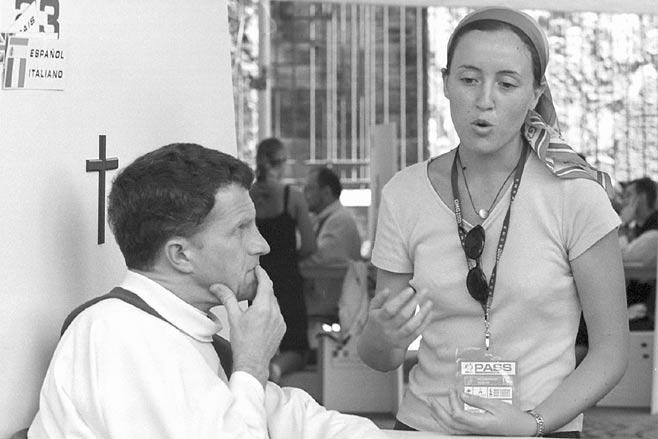
Iam also asking for renewed pastoral courage in ensuring that the day-to-day teaching of Christian communities persuasively and effectively presents the practice of the Sacrament of Reconciliation. As you will recall, in 1984 I dealt with this subject in the Post-Synodal Exhortation Reconciliatio et Paenitentia, which synthesized the results of an Assembly of the Synod of Bishops devoted to this question. My invitation then was to make every effort to face the crisis of “the sense of sin” apparent in today’s culture. But I was even more insistent in calling for a rediscovery of Christ as mysterium pietatis, the one in whom God shows us his compassionate heart and reconciles us fully with himself. It is this face of Christ that must be rediscovered through the Sacrament of Penance, which for the faithful is “the ordinary way of obtaining forgiveness and the remission of serious sins committed after
Baptism” When the Synod addressed the problem, the crisis of the Sacrament was there for all to see, especially in some parts of the world.
The causes of the crisis have not disappeared in the brief span of time since then. But the Jubilee Year, which has been particularly marked by a return to the Sacrament of Penance, has given us an encouraging message, which should not be ignored: if many people, and among them also many young people, have benefited from approaching this Sacrament, it is probably necessary that Pastors should arm themselves with more confidence, creativity and perseverance in presenting it and leading people to appreciate it. Dear brothers in the priesthood, we must not give in to passing crises! The Lord’s gifts — and the Sacraments are among the most precious — come from the One who well knows the human heart and is the Lord of history.
The Record 12 21 AUGUST 2003
√
Fr Bronek Pietrusewicz SDS holds the papal blessing given to John and Mary Rogers on their 50th Anniversary on August 15.
ocation
ocation
V
S tory V
S tory
Milton Arias - God looks after me
Rediscovering a compassionate God: a woman confesses her sins.
From the Solomons to Monrovia

“Yesterday we thought things would be calm as the announcement was made that peacekeeping forces were coming, so we went into the convent compound at 9am; at 10am we were on the floor caught up in heavy fighting.” So writes Franciscan Missionary of Mary, Sr Barbara who is currently working in Monrovia.
Speaking of his service in the Solomon Islands, Dr Chris Millar comments ‘I’m happy to stay for as long as I need to stay to get the job done properly.’
As it was once said ‘all are called to mission; some are just called to go further than others.’ The testimonies of Sr Barbara and Chris, representative of those whose vocation it is to leave their homeland and meet Christ in the midst of brokenness and suffering abroad, remind us of the missionary presence of our Church all throughout our troubled world.
After graduating in medicine, young Newcastle man Chris Millar worked in various hos-
pitals throughout Australia. A sense of dissatisfaction with his successful career led Chris to become more attentive to the enduring desire within him to serve as a missionary. Earlier this year, through the support of PALMS Australia, and also aided by Catholic Mission, he embarked on a mission placement to the island of Choiseul in the Solomons. There, Chris will begin a primary health care program and will also provide medical training to the local people. He follows in a long tradition of Australians expressing missionary compassion and solidarity with our neighbours in the Solomon Islands. The $500,000 that Catholic Mission provided to the Solomons last year to assist in building, education and community-based projects is also representative of that concern.
As Sr Barbara’s words exemplify, responding to a missionary vocation leads to a very real participation in the life situation of the people. Through sharing in the joys and sorrows of their brothers and sisters, missionaries seek to nurture the establishment of Jesus’ lib-
erating kingdom. In Liberia, where 85% of the population is illiterate, our Catholic missionaries have a particular concern to provide educational opportunities, and thus a more hopefilled future, to children. Such projects, along with health care and rehabilitation programs, are largely possible through the generosity of Catholic Mission donors.
If you would like to explore a vocation to missionary work, subscribe to a free newsletter that details the work of both lay and religious missionaries, or enquire about how you can support Catholic Mission’s projects for children, please call 9325 5264.
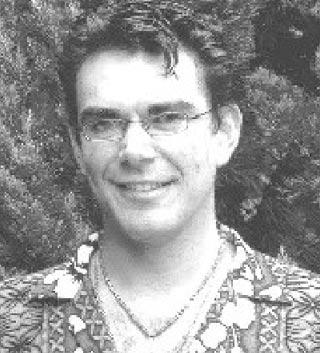 Dr Chris Millar
Dr Chris Millar
The primacy of Grace # 5
If in the planning that awaits us we commit ourselves more confidently to a pastoral activity that gives personal and communal prayer its proper place, we shall be observing an essential principle of the Christian view of life: the primacy of grace.
There is a temptation which perennially besets every spiritual journey and pastoral work: that of thinking that the results depend on our ability to act and to plan.
God of course asks us really to cooperate with his grace, and therefore invites us to invest all our resources of intelligence and energy in serving the cause of the Kingdom.
But it is fatal to forget that “without Christ we can do nothing” (cf. Jn 15:5).
It is prayer which roots us in this truth. It constantly reminds us of the primacy of Christ and,
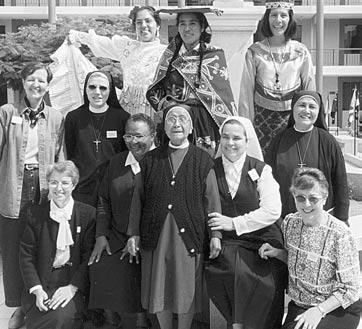
in union with him, the primacy of the interior life and of holiness.
When this principle is not respected, is it any wonder that pastoral plans come to nothing and leave us with a disheartening sense of frustration?
We then share the experience of the disciples in the Gospel story of the miraculous catch of fish: “We have toiled all night and caught nothing” (Lk 5:5).
This is the moment of faith, of prayer, of conversation with God, in order to open our hearts to the tide of grace and allow the word of Christ to pass through us in all its power: Duc in altum! On that occasion, it was Peter who spoke the word of faith: “At your word I will let down the nets” (ibid.).
As this millennium begins, allow the Successor of Peter to invite the whole Church to
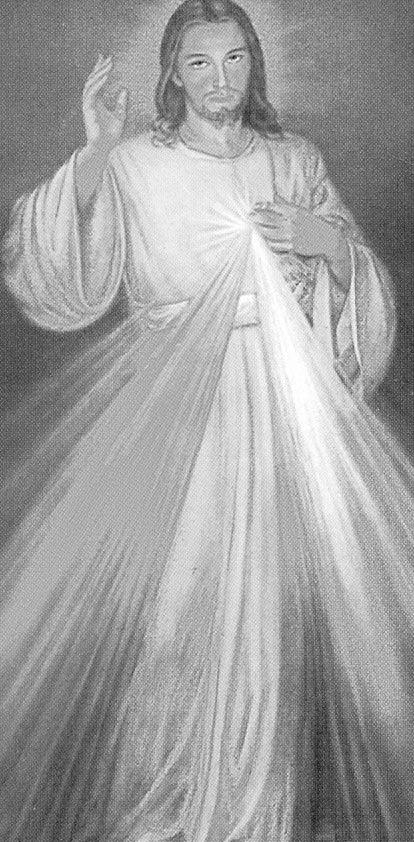
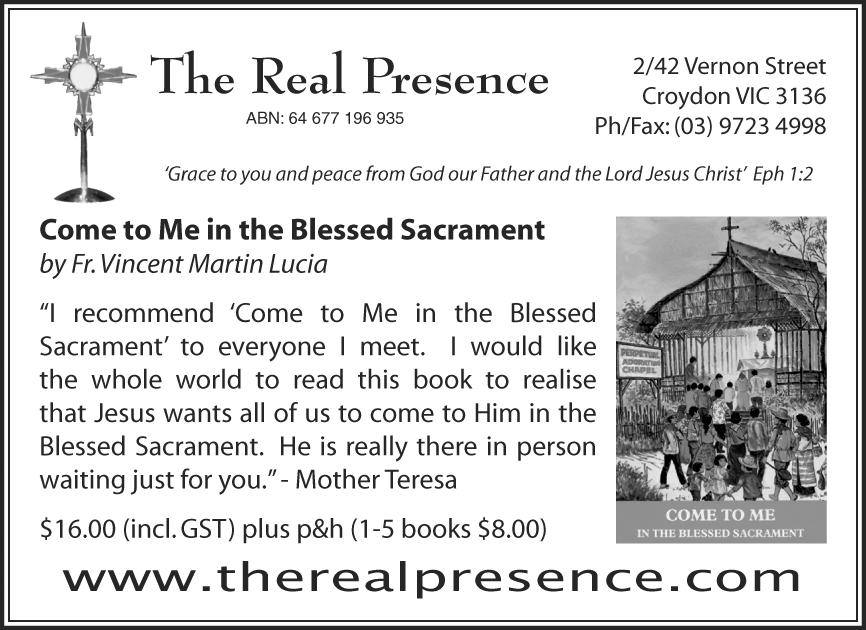
maybe you have been called to proclaim the goodness and kindness of Jesus Christ, our Saviour...
if YES than join our Salvatorian community of priests and brothers who dedicate their lives in the work of God’s Kingdom...
Salvatorians
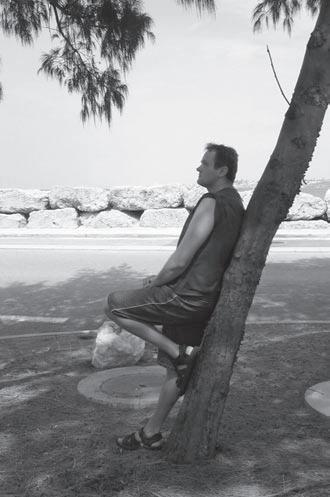
Our Lady’s Nurses for the Poor
“What difference can my life make to be a living presence of the tenderness and mercy of God in our wounded world?”
Our Lady’s Nurses for the Poor (Brown Sisters) was founded in 1913 by Eileen Rosaline O’Connor and Father Timothy Edward McGrathMSC.
Eileen and Father McGrath had a vision to improve the lives of the poor by forming a group of dedicated women who would go to their homes as disciples of Jesus Christ seeing them with the eyes of the heart and with the compassion of a loving God.
The work continues today, we have houses in Brisbane, Newcastle, Randwick, Coogee, Kings Cross and Minto and a variety of works which will bring dignity, well being and love to the poor.
For
Bag 3100
Email:olnp@ourladysnurses.org.au Web:www.ourladysnurses.org.au

The Record 21 AUGUST 2003 13 Sisters of St Joseph of Cluny
Years of Prayer Community Mission International - Multicultural Spritutality, Health, Education, Indigenous Support, Aged Care - all a humble extension of Jesus’ Mission If you have been there .... done that ....and are looking for more ..... Contact Us Vocation Directress 60 Clarence Street East Brunswick, Vic, 3057 t: (03) 9386 0494 f: (03) 9386 0335 e: clunyaus@iprimus.com.au Srs Val O’Donnell and Josephine O’Kelly Santa Teresa via Alice Springs t/f:(08) 89567 0932 e:cluny@tpg.cm.au
200
lady’s Nurses Locked
COOGEENSW2034
further information contact: Our
Contact:Fr Karol Kulczycki SDS PO Box 530, Joondalup WA 6919 Ph: (08) 9304 2907, Fax: (08) 9304 2948 region@sds.org.au, www.sds.org.au
make this act of faith, which expresses itself in a renewed commitment to prayer.
V ocation S tory T H A N K Y O U ! Several organisations provided multiple testimonies from members for this vocation edition. Unfortunately there was not enough room for everyone. But testimonies will appear in the coming weeks’ editions of The Record.
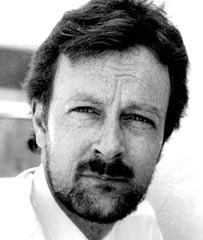
There are so many vocations for the well-meaning young person to follow today. Become a missionary, become a nurse, work at the cutting-edge of computer technology or try your hand at professional sports.
Whatever a young person’s choice, it’s likely to draw applause and support from people in the churches.
One career choice though - the media - seems to cause moral problems for a lot of people.
Journalists, they say, are just about the most lowly regarded group in our community today. Not sure if they’re ahead or behind bank managers and used car salesmen on the list of those people popularly believed to be “on the nose.”
But we’re certainly well down the list, when it comes to public esteem. This is hardly surprisingand not because journalists are any worse than anyone else, in my experience.
It’s because the media are a source of worry, anxiety and negative emotions for a lot of people in today’s world.
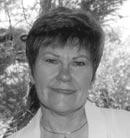
OpinionReflection &
&
Catholic opinions from around Australia
I Say, I Say....
September 11 is an example of why. When people saw those highly distressing news pictures of the planes crashing into New York’s Twin Towers back in 2001, terrorism wasn’t the only thing people blamed.
Far more familiar, and closer to home, were the media. “Why do the media have to keep showing those pictures?” many people asked.
It seems almost pointless to ask, in reply, “if you don’t like the pictures, why do you have the television turned on?”
Or “if you don’t like the news, why are you reading the newspaper?” But it’s not pointless to ask those questions.
The media, for all its faults, is something everyone relies on.
Back in the 1960s, a famous sociologist called Marshall McCluhan wrote that “the medium is the message.”
Never did understand what McCluhan meant by that, exactly. But I do understand that as far as many people are concerned, the media and the messages carried by the media do become confused.
When we don’t like the message, we blame the media. It’s a human thing to do - and it’s also a stupid thing to do.
Everyone who
has a family knows that you have to be very careful in the way you treat the media in a family context.
It’s irresponsible, for example, to let kids cruise the internet at home without supervision.
One secular internet expert I interviewed a while back said parents MUST make sure that any computer in the house that has internet access is kept permanently in a “public” part of the home where kids can’t be alone online.
Letting them sit in their bedroom on the internet is like letting your kids out on the street, in the seediest part of town, late at night, alone. It’s irresponsible, if you can possibly do it differently.
Yet how many parents who don’t supervise their kids properly when it comes to the internet are more than happy to whinge on about what an irresponsible bunch the media are?
It’s a case of media consumer, heal thyself. We’ve all got room for improvement, when it comes to the way we respond to the awesome power of modern communications.
And this is the fundamental point - it is an awesome power.
And like any awesome powersuch as fire, or gunpowder - the media can be used for good or for evil
Great evil - and great good.
INVITATION
“The Meeting of the Past and Present”
Come and join the the celebration of the Latin Mass with the songs of Taize.
Sung by members
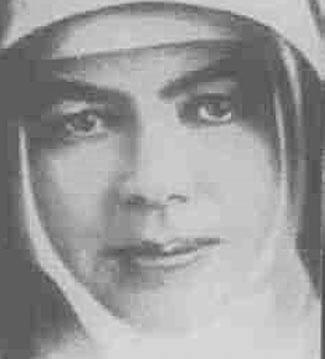
 with Paul Gray
with Paul Gray
For that reason, any choice by a well-meaning young person to get involved in the media is a choice to be welcomed. For with proper training and a heart full of good intentions towards the world, a person working in the media can achieve great things for humanity.
“As the power of the media increases, along with its “negative” effects, this power for good also increases.”
As the power of the media increases, along with its “negative” effects, this power for good also increases.
I think this is what the Catholic Church means when it teaches that the modern communications media are a great gift from God to humankind. Like any gift, they can be misused.
But it’s a refusal of grace - a sign of disobedience, even - if we treat the media as hostile forces in our lives. Sadly, that refusal of grace is something I see all too often amongst conservative and “religious” people. We need to cultivate an attitude of mind today that is realistic towards mass communications. Yes, there is all sorts of rubbish
to be found on TV, radio and the internet.
But the rubbish is not the fault of some obscure evil force called “the media.” It’s the fault of human beings, for wanting to create rubbish.
The challenge is not to ignore the media because of this rubbish. It’s to embrace the media, and use them for good.
This can be done, and is done, every day. And not just by Catholics.
An example: last year, when controversy over pedophile priests in America was electrifying the news media and driving many Catholics into new depths of despair, a new film came out, made by an atheist.
It was called Molokai, and it told the story of Father Damien, the leper priest. The movie showed Fr Damien doing many good things - among them, protecting leper children from child abusers living in the colony.
Molokai, of course, didn’t undo all the damage done by the stories of pedophile priests. But it did show that when it comes to the media, the devil doesn’t get his own way all the time.
To make sure he doesn’t, the media need more young people of good will and good intentions. This is a vocation that can, and should advance the cause of the Church.

There is no doubt that this primacy of holiness and prayer is inconceivable without a renewed listening to the word of God. Ever since the Second Vatican Council underlined the pre-eminent role of the word of God in the life of the Church, great progress has certainly been made in devout listening to Sacred Scripture and attentive study of it. Scripture has its rightful place of honour in the public prayer of the Church.
Individuals and communities now make extensive use of the Bible, and among lay people there are many who devote themselves to Scripture with the valuable help of theological and biblical studies. But it is above all the work of evangelization and catechesis which is drawing new life from attentiveness to the word of God.
Dear brothers and sisters, this development needs to be consolidated and deepened, also by making sure that every family has a Bible. It is especially necessary that listening to the word of God should become a life-giving encounter, in the ancient and ever valid tradition of lectio divina, which draws from the biblical text the living word which questions, directs and shapes our lives.
The Record 14 21 AUGUST 2003
of the Polish Youth Theatre
Our Lady Queen of Poland Chapel, 35 Eighth Ave, Maylands, commencing at 7pm on
August 31
and Homily will be in both Polish and English. All are invited young and old alike.Copies of the Latin Mass will be available at the entrance of the chapel.
Group “SCENA98” At
Sunday
Readings
Listening to the Word # 6 The Answer!!!!!! Come and talk to a Sister of St Joseph of the Sacred Heart. Sit with her and discern if God is calling you, to 'relieve suffering and bring hope' to a world that needs you, a vital young woman, spread God's message of peace and love! Contact Sr Margaret Kane 7 Ostle Street MULLALOO WA 6027 Phone and fax 9401 9916 email: margk@iinet.net.au WHAT WILL YOU DO WITH YOUR LIFE? Come with your gifts and we will work together, hand in hand with God to transform our times. You are the one! Hop on the phone now. Don't waste your life!
Truckie brings faith on the road

When Vince Sammut parks his 10-metre long truck in front of a Catholic Church, people are often surprised because Vince does not seem like your typical daily Mass goer.
And when they get to know him and find that he is a member of Opus Dei, they might be tempted to conclude that Opus Dei is something just for truckies.
In the early days, there was much confusion about the kinds of people who were “typical” members of Opus Dei. Because the founder of Opus Dei, Saint Josemaría Escrivá began his apostolate with university students, many observers concluded that Opus Dei was only interested in professionals, or worse still, only the wealthy.
But times have changed, and now that Opus Dei has been made the church’s first Personal Prelature with a mission to spread the universal call to holiness to ordinary lay people of all backgrounds, from university professors to taxi drivers, its nature is more clear.
Vince has been a member of Opus Dei for more than 10 years. He says the main impact on his life has been in getting him to take his faith more seriously than he would otherwise have done.
“An old school friend first introduced me Opus Dei,” he said.”He took me along to some recollections that were given by a priest in a local parish church.
“But I really started to get enthusiastic after I attended a public get-together that was held when the then Prelate of Opus Dei, Bishop Alvaro del Portillo, visited Australia.
“I started to realise that it was all about giving importance to the little things of each day. On the whole, Opus Dei was not asking me to do anything differently from what I was already doing.
“Of course, I did start trying to get to daily Mass when I could and I prayed more, but the most important thing was trying to do the ordinary things that I had always done a bit better and consciously offering them up to God.”
Vince said he learnt from Opus Dei that nothing that you do is worthless.
# 7
TEverything, even suffering, has value.
“Before that I would not have thought these things had any value,” he said, “but I learnt, bit by bit, to offer them up. And I started to realise just how natural it was. If I wanted to try to be holy I didn’t necessarily have to go off and be a monk, I could do it where I was, doing the things that I had always done, but for God. ”
Vince said that for a truck driver trying to grow in sanctity partly meant trying to give his employer good value by doing his job as well as possible. But it also meant treating other drivers on the road better.
“ . . . w h e n s o m e o n e e l s e d o e s t h e w r o n g t h i n g y o u d o n ’ t l e t y o u r s e l f g e t h o t u n d e r t h e c o l l a r a b o u t i t Y o u j u s t o f f e r i t u p t o G o d . F o r m e , l i t t l e t h i n g s l i k e t h a t a r e w h a t O p u s D e i m e a n s w h e n i t s a y s y o u s h o u l d s a n c t i f y y o u r w o r k ”
“When you spend half your life on the road you find there are many opportunities to do a good turn,” he said. “People talk a lot about road rage these days. I don’t know whether that is the best term for it, but there is a lot of tension on the roads and I think you can help bring the temperature down a bit by trying to show people some courtesy. And when someone else does the wrong thing you don’t let yourself get hot under the collar about it. You just offer it up to God. For me, little things like that are what Opus Dei means when it says you should sanctify your work.”
Another way that Vince tries to live his vocation to Opus Dei is by doing apostolate with those he comes in contact with through his work.
“That does not mean preaching to them about religion,” he said.
“I suppose you mainly try to show by example. And sometimes, when people see you trying to be cheerful and do the right thing, they will come to you and tell you about their problems. Often all you can do is listen, and sometimes that is
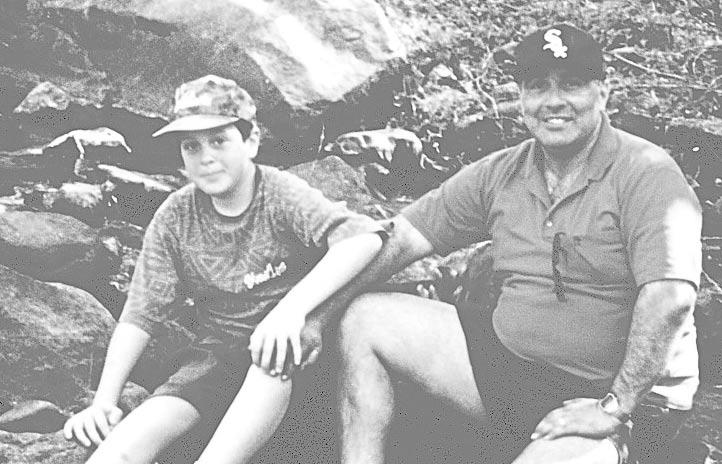
enough. Other times you can give them a bit of advice.
“For instance, there was a customer I used to see regularly and one day he confided in me that he was having trouble with drinking and that his wife was leaving him.
“I spent a lot of time with him just listening. But then I started to urge him to do something about it – to make the move and take some definite action to help him give up the drinking.
“Anyway, he took the advice, managed to give up the drinking and saved his marriage as well. It was very humbling when his wife was waiting one day when I pulled up in the truck and she came over and thanked me for helping him. I didn’t really think I had done much, but sometimes people don’t need a lot. They just need some friendship.
“There have been other occasions where friendship has led to talking about the faith and friends have come along to Opus Dei functions as well. Some have become members. But that is not the reason for the friendship. It is just something that can grow from it.”
Vince says his membership of Opus Dei has also helped him with his family life.
Proclaiming the word
o nourish ourselves with the word in order to be “servants of the word” in the work of evangelisation: this is surely a priority for the Church at the dawn of the new millennium. Even in countries evangelised many centuries ago, the reality of a “Christian society” which, amid all the frailties which have always marked human life, measured itself explicitly on Gospel values, is now gone. Today we must courageously face a situation which is becoming increasingly diversified and demanding, in the context of “globalisation” and of the consequent new and uncertain mingling of peoples and cultures. Over the years, I have often repeated the summons to the new evangelisation. I do so again now, especially in order to insist that we must rekindle in ourselves the impetus of the beginnings and allow ourselves to be filled with the ardour of the apostolic preaching which followed Pentecost. We must revive in ourselves the burning conviction of Paul, who cried out: “Woe to me if I do not preach the Gospel” (1 Cor 9:16).
The respect due to the different paths of different people and with sensitivity to the diversity of cultures in which the Christian message must be planted, in such a way that the particular values of each people
will not be rejected but purified and brought to their fullness.
In the Third Millennium, Christianity will have to respond ever more effectively to this need for inculturation. Christianity, while remaining completely true to itself, with unswerving fidelity to the proclamation of the Gospel and the tradition of the Church, will also reflect the different faces of the cultures and peoples in which it is received and takes root. In this Jubilee Year, we have rejoiced in a special way in the beauty of the Church’s varied face. This is perhaps only a beginning, a barely sketched image of the future which the Spirit of God is preparing for us. Christ must be presented to all people with confidence. We shall address adults, families, young people, children, without ever hiding the most radical demands of the Gospel message, but taking into account each person’s needs in regard to their sensitivity and language, after the example of Paul who declared: “I have become all things to all men, that I might by all means save some” (1 Cor 9:22). In making these recommendations, I am thinking especially of the pastoral care of young people
Precisely in regard to young people, as I said earlier, the Jubilee has given us an
encouraging testimony of their generous availability. We must learn to interpret that heartening response, by investing that enthusiasm like a new talent (cf. Mt 25:15) which the Lord has put into our hands so that we can make it yield a rich return. May the shining example of the many witnesses to the faith whom we have remembered during the Jubilee sustain and guide us in this confident,enterprising and creative sense of mission. For the Church, the martyrs have always been a seed of life. Sanguis martyrum semen christianorum:25 this famous “law” formulated by Tertullian has proved true in all the trials of history. Will this not also be the case of the century and millennium now beginning?
Perhaps we were too used to thinking of the martyrs in rather distant terms, as though they were a category of the past, associated especially with the first centuries of the Christian era. The Jubilee remembrance has presented us with a surprising vista, showing us that our own time is particularly prolific in witnesses, who in different ways were able to live the Gospel in the midst of hostility and persecution, often to the point of the supreme test of shedding their blood. In them the word of God, sown in good soil, yielded a hundred
He says this has meant struggling to be a better husband to his wife, Rhonda, and a better father to his three children –Bronwyn, Corrinne and Anthony, all of whom made it into university and are pursing professional careers.
One of the more public manifestations of Vince’s dedication to his family was in the mid-1990s when some local papers carried stories about a father and son club that he set up with his friends.
“We started having regular events every Saturday afternoon – games of football, bushwalks, camps and that sort of thing,” Vince said. “And afterwards we organised some talks to help the boys live virtues better – things like responsibility, industriousness and so on. And all of that led on to things of the faith as well.
“The fellows who used to come along said that it helped them a lot. Apart from anything else it helped the dads and their sons get closer.”
Vince summed up: “But things like clubs are really secondary. The main thing in Opus Dei is learning to love God and others more, particularly through your work and your ordinary duties as a Christian. For the help that I get in doing that I am very thankful to Saint Josemaría.”
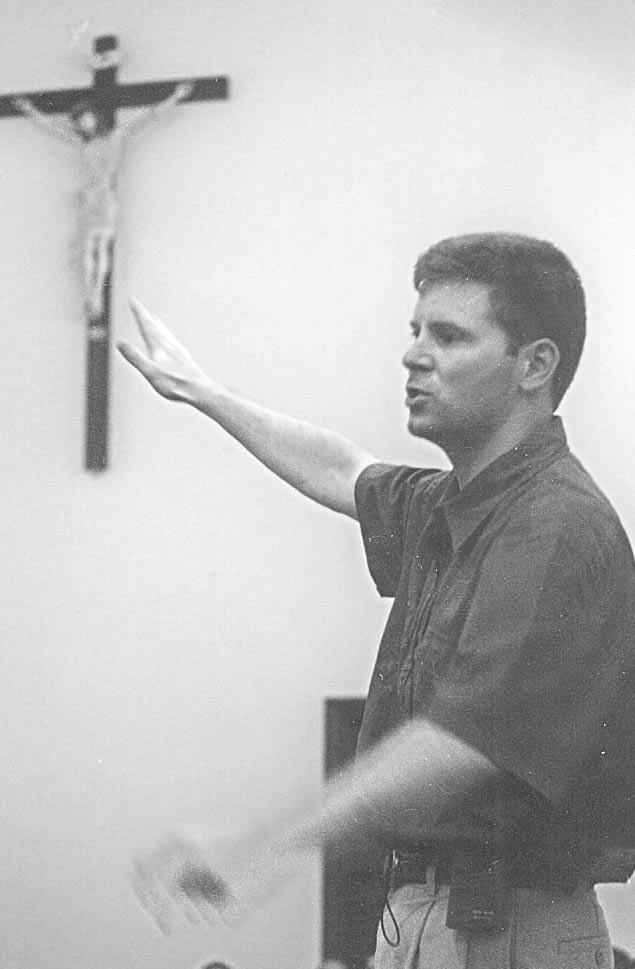
fold (cf. Mt 13:8, 23). By their example they have shown us, and made smooth for us, so to speak, the path to the future. All that remains for us is, with God’s grace, to follow in their footsteps.
The Record 21 AUGUST 2003 15
V ocation S tory
Opus Dei member, truckdriver Vince Sammut, teaches son Anthony about faith while having fun at their local fathers and sons’ club.
Putting your fate in the hands of God
"We didn’t choose to come to Australia, but we were chosen at random, to be sent by Pope John Paul II at the Jubilee of the Family on October 14th, 2000."
This is the story of Gian Pietro and Caterina of East Fremantle Parish.
The "sending out" by the Holy Father of the mission families to many different parts of the world, took place nearly three years ago in St Peter’s Square.
"I had a good job, that I gave up to follow the call to be missionary", says Gian Pietro.
"I was in the Neocatechumenal Way", says Caterina, "and I heard of these families who wanted to go to foreign countries. I felt the desire to do the same, not just to evangelise, but to do it for myself, to prove to myself that God would provide for me in a foreign country, without family, friends, relying totally on Christ.
“I did not stand up (to go on mission) at first, because I wasn’t sure if I was being called. After a few years, I stood up, to prove to myself that God would provide, that I would be happy if I loose my life for the mission."
"Even though we have been in East Fremantle Parish for two years, it is still difficult; only Jesus Christ helps. I am very proud. I like to hide myself instead of preaching the gospel. God has put me in situations where I have to speak of Jesus, like when I had my baby two months ago.
“I was in hospital for three days, and every day a nurse and a social worker came to ask me if I wanted sterilisation before going home. They were surprised I didn’t want contraception because this was my ninth child."
"What do we do as a Mission Family? Just our presence is enough to bring Jesus Christ to this suburb.

SOur daughter Micol, says that in her class ten girls have divorced parents. If after 14 years we are still together, this is already a sign that it is possible to remain together as husband and wife - not because we are better than others, but because Christ is alive. We can forgive each other. We are like all other couples.
“ W h a t d o w e d o a s a
M i s s i o n F a m i l y ? J u s t o u r
p r e s e n c e i s e n o u g h t o
b r i n g J e s u s C h r i s t t o t h i s
s u b u r b ”
Gian Pietro felt this call to be missionary coming from being in the community after many years in the Church in his own parish in Piacenza.
Many doubts came up about the children leaving Italy: if we stayed in our own country with a comfortable life, we could give the children a better future.
We could have given them everything, but without giving them faith, we would be giving them nothing.
Caterina said that the children have also seen the providence of God. We ran out of money and God has provided money, food and clothes. The children see the love of God for us. God has spoiled us even while being precarious. But we have not been alone; the community, the parish, our Bishop have been behind us in our mission. God has put our faith to the test.
Says Caterina:“In August last year, I lost a child; it was the first time I lost a child [through still-birth]. On the very same day this year, I had an operation in the hospital. It was not a co-incidence; these two facts are a call to conversion for me, that human suffering has a meaning.
“Our daughter, Micol, told us this year that this day, August 6th, was the birthday of their brother, who is in heaven. God was speaking to me through my daughter, because I had thought of my child only as dead, as a failure.
“Yet he is alive in heaven. This was good news. Yet this is a common experience for women in Australia. Death has been overcome; Christ is really risen. Here is our mission.
The diversity of vocations
uch a vision of communion is closely linked to the Christian community's ability to make room for all the gifts of the Spirit. The unity of the Church is not uniformity, but an organic blending of legitimate diversities.
It is the reality of many members joined in a single body, the one Body of Christ (cf. 1 Cor 12:12). Therefore the Church of the Third Millennium will need to encourage all the baptised and confirmed to be aware of their active responsibility in the Church's life.
Together with the ordained ministry, other ministries, whether formally instituted or simply recognised, can flourish for the good of the whole community, sustaining it in all its many needs: from catechesis to liturgy, from the education of the young to the widest array of charitable works.
Certainly, a generous commitment is needed — above all through insistent prayer to the Lord of the harvest (cf. Mt 9:38) — in promoting vocations to the
priesthood and consecrated life. This is a question of great relevance for the life of the Church in every part of the world.
“ T h e r e i s a p r e s s i n g n e e d t o i m p l e m e n t a n e x t e n s i v e p l a n o f
v o c a t i o n a l p r o m o t i o n , b a s e d o n p e r s o n a l c o n t a c t a n d i n v o l v i n g p a r i s h e s , s c h o o l s a n d f a m i l i e s i n t h e e f f o r t t o f o s t e r a m o r e a t t e n t i v e r e f l e c t i o n o n l i f e ' s e s s e n t i a l v a l u e s . ”
In some traditionally Christian countries, the situation has become dramatic, due to changed social circumstances and a religious disinterest resulting from the consumer and secularist mentality.
There is a pressing need to implement an extensive plan of vocational promotion, based on
personal contact and involving parishes, schools and families in the effort to foster a more attentive reflection on life's essential values.
These reach their fulfilment in the response which each person is invited to give to God's call, particularly when the call implies a total giving of self and of one's energies to the cause of the Kingdom. It is in this perspective that we see the value of all other vocations, rooted as they are in the new life received in the Sacrament of Baptism.
In a special way it will be necessary to discover ever more fully the specific vocation of the laity, called "to seek the kingdom of God by engaging in temporal affairs and by ordering them according to the plan of God"; they "have their own role to play in the mission of the whole people of God in the Church and in the world ... by their work for the evangelisation and the sanctification of people".
Along these same lines, another important aspect of communion
 By Therese Dabbs
By Therese Dabbs
The Lord has worked in amazing ways in my life to mould me and shape me into the person he has called me to be. I believe my primary vocation is to be a wife and mother. In embracing this calling from God I have experienced a deep inner peace.
I come from a family of ten children. My own wonderful mother gave up so much to raise me (as did my father) and was always there for me, right through school and even when I left school and home. Our family struggled because of the fact we had one income and there were so many of us, but the Lord always blessed us.
I did very well at school and went on to study Chemistry and do a Dip~Ed. After finishing my degree I served for two years on the Disciples Youth Mission Team. It was while serving on the team that I met my wonderful husband, Nick, who was also on the Team.
The Lord placed a love in my heart for him and showed me that he was the man intended for me to marry. We did marry, two years later, and two years after that had our first child. During this time, from the realisation that the Lord had intended me for marriage, until now, I have had to continually let go of many things. Being so academic meant I had a lot of ambition to continue study and further my career as a teacher. I married at 24 and felt that I had just scraped the surface in terms of where and what I could do with my work.
As I let go of my own ambition and desires, the Lord placed on my heart a desire to be a loving wife and mother. This desire grew as I let go of my job and gave birth to our first child. We now have two daughters and I am still at home with them full time. I could go back to work but I feel that my work is in teaching and raising these two precious gifts that the Lord has blessed us with. As I continue to let go, He continues to fill my heart with joy and a peace knowing that I am doing his will. The beautiful sacrifice my own mother made for me I want to make for my own children that they would grow up to know, love and serve our Awesome God.
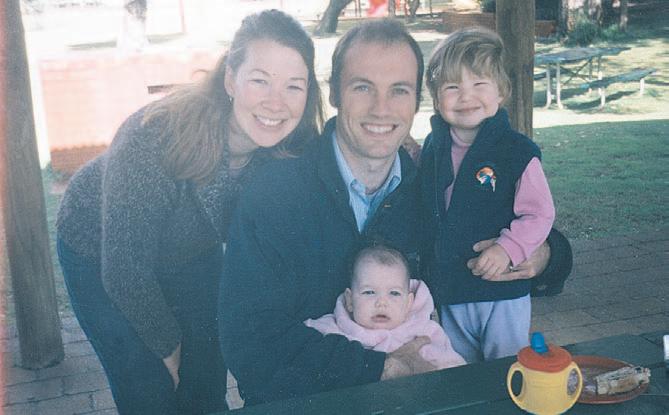
is the promotion of forms of association, whether of the more traditional kind or the newer ecclesial movements, which continue to give the Church a vitality that is God's gift and a true "springtime of the Spirit".
Obviously, associations and movements need to work in full harmony within both the universal Church and the particular Churches, and in obedience to the authoritative directives of the Pastors.
But the Apostle's exacting and decisive warning applies to all: "Do not quench the Spirit, do not despise prophesying, but test everything and hold fast what is good" (1 Th 5:19-21).
At a time in history like the present, special attention must also be given to the pastoral care of the family, particularly when this fundamental institution is experiencing a radical and widespread crisis. In the Christian view of marriage, the relationship between a man and a woman — a mutual and total bond, unique and indissoluble — is part of God's
original plan, obscured throughout history by our "hardness of heart", but which Christ came to restore to its pristine splendour, disclosing what had been God's will "from the beginning" (Mt 19:8).
Raised to the dignity of a Sacrament, marriage expresses the "great mystery" of Christ's nuptial love for his Church (cf. Eph 5:32). On this point the Church cannot yield to cultural pressures, no matter how widespread and even militant they may be.
Instead, it is necessary to ensure that through an ever more complete Gospel formation Christian families show convincingly that it is possible to live marriage fully in keeping with God's plan and with the true good of the human person — of the spouses, and of the children who are more fragile. Families themselves must become increasingly conscious of the care due to children, and play an active role in the Church and in society in safeguarding their rights.
The Record 16 21 AUGUST 2003
V ocation S tory
Gian Pietro and Caterina Pagani, with Mattia 13, Gionata 11, Micol 10, Martino 8, Francesco 7, Andrea 6, Filippo 4, Giuseppe 2, Chiara 2 months, married in 1989 in Piacenza, near Milan, Italy.
Awesome God # 8
The Dabbs family
Answering a lifelong call
The cloister beckoned from an early age
Ihad always wanted to be a Nun. As far back as I can remember I kept this secret hidden in my heart. On my First Communion Day (aged 7) I prayed that "If I was a good girl, when I grew up, could I be a nun" ?
I held a certain strong conviction that one day, this would be so. I always felt an equally strong need within me to keep this precious information hidden! If asked what I wanted to be when I grew up I was most careful to turn people's attention away from this topic. I continued my first communion prayer throughout the years until my entry into Religious Life when I re-phrased it to an ardent petition for holy perseverance until death.
A s I g r e w o l d e r g i f t s o f m u s i c a n d s p o r t l e d t o a m e a s u r e o f s u c c e s s a n d s o m e g l a m o u r a n d a m o d e l l i n g c o u r s e a n d s o m e c a r e e r w o r k i n t h i s f i e l d i n t e r e s t e d m e f o r a t i m e .
I realise now that I had actually ‘prayed for a vocation’!
I was born into a happy and secure family with model parents, devoted and loving teachers of their children. I was of an outgoing, enthusiastic, fun-loving disposition. My devout Catholic Mother nurtured the natural piety within me and I had the privilege of a complete catholic education by Religious Sisters in long flowing Habits and pretty coifed faces.
I loved sport and music and was a conscientious student at school. I tried to keep pace with a fond elder brother which led me to playing cricket, handball. surfing bush-hikes, horse-riding and even games of 'ghosts'!
As I grew older gifts of music and sport led to a measure of success and some glamour and a modelling course and some career work in this field interested me for a time.
A good Parish Priest of those years made a deep impression upon me on account of
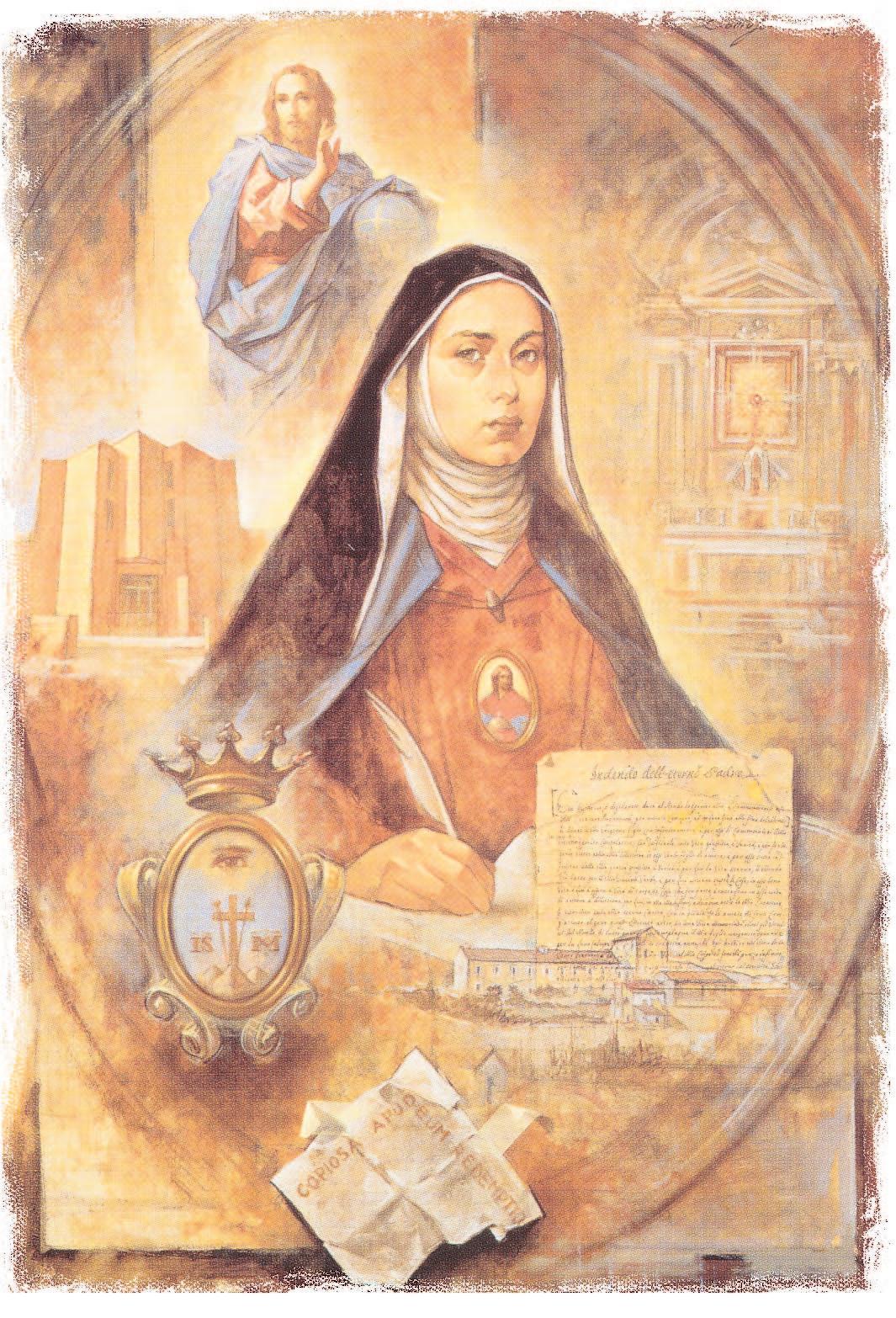
his own personal example. Growing up I imagined that God must be so wonderful because Father spoke with such an eloquence and conviction that my heart began to experience the deep stirrings of
this Love for God. Father would speak of the great St Teresa, St Augustine, the Cure of Ars, and so many others, and my secret longing to be a nun began to expand! I thought to myself - one day I would love to
The beauty of chastity
 V ocation S tory
By Grant Goddard
V ocation S tory
By Grant Goddard
For the last couple of years, I've been involved with True Love Waits here in WA. It is a movement that promotes chastity amongst young single people by helping them understand the meaning of our sexuality according to God's divine plan and encouraging self-integrity, selfworth and real love.
C h a s t i t y i s m o r e t h a n j u s t a b u n c h o f r u l e s a b o u t a b s t a i n i n g f r o m s e x u a l a c t i v i t y o u t s i d e o f m a r r i a g e .
Chastity is more than just a bunch of rules about abstaining from sexual activity outside of marriage. At first it's about discipline and self-mastery, but after gradually understanding and
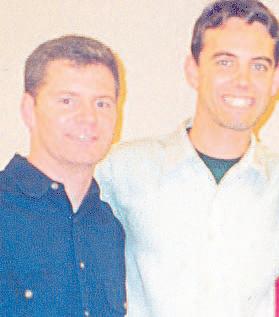 Grant Goddard and Christopher West
Grant Goddard and Christopher West
appreciating the gift of our sexuality in light of God's design, chastity is about transforming the desires of the heart to be more in tune with the Spirit of God and to love like He loves.
Regarding vocations, chastity and understanding is also essential for consecrated religious, to help them love and desire their celibacy and for married people to help them put their own sexual desires under
control out of self-giving love for their spouse and family.
Some may think that chastity is a burden of deprivation. But on the contrary, the fruit of chastity is the possession of a peaceful happiness you feel in your heart.
For me, this is one of the biggest joys and the beauty of chastity that I want to share with the world. However I don't claim that it's easy to be chaste - it's a life-long battle.
Chastity requires understanding of God's divine plan for our sexuality and it will not be found by listening to the world, which does not know it.
Our movement is addressing this need through prayerfully learning about God's plan ourselves and sharing this with other young people, particularly in secondary schools.
This is why a group of us flew to Melbourne to attend Chris West's Theology of the Body two-week course.
My involvement in this group is a calling from God. It is a vocation for me and I do it for His glory.
be called 'Sister Teresa'
As the years passed, like any normal young woman I experienced the thrill of so many worldly pleasures and entertainments. During these years I joined the Legion of Mary in response to a personal love for her and this led to a strong and lasting Marian devotion which proved a mainstay not only during the adolescent years but throughout my entire Religious Life.
Upon leaving school I continued to study music at the conservatorium as well as holding a clerical position.
At eighteen, being convinced of my Call to the Religious Life and having been accepted, I entered a Teaching Congregation and found such deep joy in my Consecration to God and in the Religious Life. After a number of years I became aware of another call from God to the Cloister and not wishing to abandon my Vows or the Religious Life I was able to be canonically transferred to the Order of the Most Holy Redeemer.
As a Redemptoristine my love for God has found its fullest expression. The cloistered contemplative vocation enables the nun to devote her entire life and existence to the worship of God alone, in silence, solitude, prayer and penance.
As a Redemptoristine our charism to be a "living memory of Christ the Redeemer" becomes a reality in a simple lifestyle which focuses upon the Mystery of Jesus Redeemer in His Life, Passion and Death, His Resurrection and His Glory. We look at Jesus on the Cross and exclaim – "This taught us Love. He loved us and gave Himself up to death for us."
"If you can have some share in the sufferings of Christ, be glad…" We as Redemptoristines wish to continue in our life this self-emptying of Christ in union with His on-going Redemption. The entire gift of oneself is an offering for the salvation of all humanity in the simplicity and joy of our Redemptoristine Vocation and becomes an experience of fulfilment, joy, peace, hope and great LOVE !
"Although hidden in Christ and scarcely visible to the eyes of the world, our life of adoration, praise atonement and intercession is of itself fully apostolic and missionary." (Rule)
God gave me the time to help
others

V ocation S tory
By Paul Green
Does one choose to be single? I think not.
When I was young I remember serving as an Altar boy with the late Bishop Healy and I was fortunate to have a mother with such a great faith and strong belief in Our lady and the Rosary.
Hence we always seemed to have priests and sisters around, especially priests, for Sunday lunch.
Those days I was a hardware specialist, so most Saturdays I found myself fixing and maintaining things at our local Church or presbytery.
Now throughout the past 35 years I have helped priests, sisters and people from all walks of life with their prob-
lems. And what I have received in return is a great satisfaction in helping people.
What was my gift from God?
It was the ability to fix and solve problems to the best of my ability. I have often been asked why I did not become a priest of get married? I think perhaps God wanted someone to do the little things in life and without knowing it He gave me a gentle nudge in the right direction.
So today at 50 years old I am still a hardware man, still doing the little things. We always say we don’t have enough time to do anything, but God gave me the time to help others.
So being single is a vocation you don’t choose yourself, it’s a gentle nudge in the right direction.
Remember the little things in life and put your trust in God for He will look after the rest.
The Record 21 AUGUST 2003 17
A quiet place for discernment
I t i s a l a r g e , o l d
F e d e r a t i o n - s t y l e h o u s e o n V i n c e n t S t r e e t i n M o u n t L a w l e y , b l e n d i n g i n n i c e l y w i t h t h e o t h e r h o u s e s o n t h e s t r e e t T h e c r o s s a t t h e e n t r y w a y a n n o u n c e s i t s r e l i g i o u s p u r p o s e , b u t m o s t p a s s e r s b y w o u l d h a v e n o i d e a w h a t t h a t p u r p o s e i s .
To its door come a variety of people: men and women, young and old, Australian and foreign. One is a twenty-something young man confiding his interest in religious life, another is a just-turned-thirty young woman who wants to do some home missions work. There is the middle-aged accountant who has decided to apply to enter the Guildford seminary, and then there is the recently-married young couple seeking marriage counselling.
A former resident from five years ago, a Northern Irishman, emails a request for a referral letter; he has finally decided to study for the priesthood. Two Perth girls who used to visit for spiritual direction send a newsy letter about their activities as Ursuline novices in Rome.
A dozen young adults show up on a Thursday night to discuss the upcoming Sunday’s readings, just as an engaged couple finishes preparing their wedding liturgy. A woman who was educated in Catholic schools years ago makes an appointment to learn how she can be baptised at last. A parish RCIA group makes its preEaster retreat day in the house.
Among those who have come to the door in the past six years, either to visit regularly or to live for a time, are three priests ordained for Perth, three religious women, five religious men, seven seminarians in other dioceses, three lay missionaries, two lay students of theology, several dozen married couples, two dozen teachers in Perth’s Catholic schools, and another couple of dozen converts to the Faith. It’s a very well-kept secret, yet it works. Some who enter are surprised to discover a chapel in the house; others come intentionally to make a visit to Jesus in the Blessed Sacrament. Priests and religious stop by for confession, to quietly pray the Liturgy of the Hours or just to chat with the director.
There is a wide variety of lay people who make appointments for spiritual direction or coun-
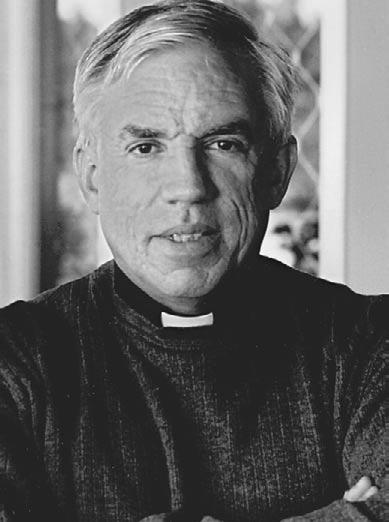
selling. Some who are free to do so set aside days, weeks or even months to ‘live in’ and focus on their calling.
What is that calling, that vocation? St Thérèse of Lisieux put it succinctly in her own situation: “I want to be a saint!” The Second

Vatican Council echoed that aspiration when it said, “All Christians are called to holiness.”
Casa Frassati is a vocations discernment centre. It is a place where the focus is on asking God what He is asking of us. And since everyone has a vocation –to married or single life, to priesthood or religious consecration or a faithful lay life – it is a place for everyone.
Quite a few people, including many priests, think that Casa Frassati is a ‘pre-seminary’, and that it is for men only. Many have never heard of it, while some have heard of it but think it is defunct. It has had three homes in six years: Rossmoyne, Greenmount and now Mount Lawley. In its own way, Casa Frassati is like the ordinary Catholic Christian: quiet, unobtrusive - even hidden – and a bit misunderstood. Like the ordinary Catholic Christian, it is ‘on the move’, a pilgrim in this busy world. And, like the ordinary Catholic Christian, it just keeps plugging along.
This centre has found its most recent home in Gibney House.
Like Casa Frassati itself, Gibney House has gone through several
metamorphoses: first as the private home of a Cathedral housekeeper, then as the residence of Perth’s third bishop, Matthew Gibney. It later served as the presbytery of Sacred Heart Church in Highgate, then as the base for several priests on ‘special assignment’ for the Archdiocese, and most recently as a Franciscan friary.
Now its tiny chapel is decorated with large framed photographs of a recently beatified Italian, Pier Giorgio Frassati, who led a quiet Catholic life of secretly serving the poor and the sick in his city of Turin, while at the same time pursuing an engineering degree and sharing all the usual parties and sport activities with his uni friends.
He himself was discerning his own vocation: should he be a priest? a married man? a single lay missionary? Through daily Mass and prayer, regular confession, and frequent visits to his priest-spiritual director, Pier Giorgio sought to discern God’s call for his life. In a certain sense, he never had to make a final decision, because he contracted polio from a beneficiary of his kindness. He died, painfully and sud-
denly at the age of 24, calling upon God to welcome him into heaven. And it was only when he died that his family learned the extent of his ministry, his spirituality, and his impact upon the entire city. 10,000 people attended his funeral – and the cause for his canonisation was begun. Pope John Paul named Blessed Pier Giorgio the patron of university students; but at Casa Frassati –Frassati’s House – he is also the patron of those who are, like him, discerning God’s call for their lives.
Again, that call is to be holy, and to be saints. Most Catholics are never canonised, yet all Catholics are called to be saints. Their lives are rarely dramatic; they usually spend their lives quietly, touching family and friends and perhaps a few others. But the moment of death should reveal whether or not they have responded to God’s call in their lives; and if they have, it will be known in one way or another. It took death to reveal the holiness of St Thérèse of Lisieux, and it took death to reveal the holiness of Blessed Pier Giorgio Frassati.
If we want to become saints, we must be prepared to respond to God at some definite point in our lives, and then to live that response over the long haul, over a lifetime. This is why it is so important to discern our calling carefully, prayerfully, and with guidance. We only have one lifetime with which to serve God, and we want to make sure we are doing what He has planned for us.
F o r m o r e i n f o r m a t i o n :
Fr Timothy Deeter, at: Casa Frassati
50 Vincent Street Mount Lawley WA 6050 (08) 9328 4518 casapgf@iinet.net.au
Living on the edge, being with those on the margins
By Brian Coyne
Religious life today, according to Christian Brother, Steve Bowman, is “a challenge of trying to live on the edge... of society... and of the Church”.
With 30 years of professed life behind him and some pretty rugged challenges, he’s had a lot of time to think about what he’s doing with his life.
Today his life is consumed helping those people at the margins of society who have been displaced from their homes and countries and end up here as refugees.
Most of them have spent years in refugee camps. Some are young, some are old, many are family groups cut off from their larger families still held in refugee camps or back in the turmoil of their homelands.
When Steve joined the Christian Brothers in the 1970s, the work of the Brothers in Australia was still focused at the-then “margin” in society where many were struggling to access a decent standard of education. Catholics in particular were among “the poor and marginalised” in Australian society.
Education, in the sense it once was, is no longer “at the margin” in Australian society. Catholics themselves are no longer “at the margins” either.
But while Catholics have moved on, there are many others who remain marginalised and struggling to get a foothold on the edges of society.
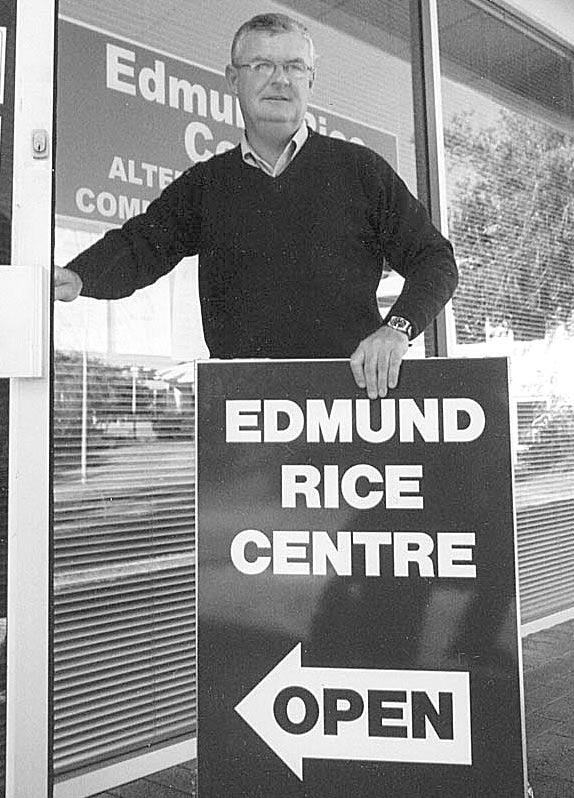
nings in 1998, the Edmund Rice Centre at Mirrabooka has now helped over 1,000 migrants find their feet in Australian society. Steve, and a small band of Brothers, are the yeast amongst over 30 lay volunteers who teach English, offer companionship, collect and distribute household goods, undertake youth work, and raise money to help the new marginalised in Australian society.
The programs offered by the Edmund Rice Centre also reach out to assist urban indigenous people, particularly the young.
Steve does not see the work of the Centre as political – agitating for change. The Centre seeks to serve refugees face-to-face.
For a time it was providing much assistance to refugees on Temporary Protection Visas who had been released from the detention camps in Australia. The bulk of their work, though, continues to be with the vast number of refugees who arrive each year through the official channels.
finds this life of service certainly impacts on his own prayer life and personal growth.
The Brothers and the volunteers do strengthen one another through a shared spiritual outlook and times for prayer, quiet meditation and shared meals. But they see that as their own personal spiritual “refuelling” station to maintain the sense of optimism and hope that they can share with those who have often come from years of nothing but pessimism and totally devoid of hope.
Steve does not see his work as preaching, but as a life of witness. In the spirit of Edmund Rice, he sees his Centre as offering companionship and hope to those trying to re-discover these most essential human qualities in their lives.
He’s now “out there” seeking to motivate people, seeking enterprising ways to raise money to sustain the endeavour, seeking to find the financial patrons, donors and the volunteers who could help bring hope to those who had come to see themselves as being without any. Open
Those who follow in the footsteps of Edmund Rice, the founder of the Christian Brothers, are also constantly moving to the new “margins” in society. In 1998 Steve put the idea to his superiors of establishing a shop-front operation to serve refugees. He saw this as a work “on the edge” of the mission of the Church as well as a mission on the “edge of society”. From small begin-
But even within this population there are many who can’t master the language skills within the courses paid for by the government. Many lack the basic essentials to even set up a home.
As Steve says, “others drop through the net in other ways and require more assistance than can be provided directly by the government programs”. The Brothers and volunteers at the Edmund Rice Centre serve people of all faiths and none. Steve
If you would like to assist the work of the E d m u n d R i c e C e n t r e financially (donations tax deductible), or as a volunteer, or have household goods to donate for use by refugees, contact Br Steve Bowman at the Edmund Rice Centre Mirrabooka on (08) 9440 0625.
The Record 18 21 AUGUST 2003
for
business: Steve Bowman
Fr Timothy Deeter
Young, inspiring, a saint for modern times:Blessed Pier Giorgio Frassati.
ACCOUNTANT
TAX RETURNS, mobile tax return preparation service.For all your tax and accounting needs - business and personal.Contact John Edwards 9338 6773all hours.
BUILDING TRADES
BRICK re-pointing.Phone Nigel 9242 2952
ELECTRICIAN, Power/light points from $50 each. Rewiring our speciality. 0418 941 286, 9279 5008.
LIC.PLUMBER/gas fitter, Contact John on 9457 7771, Mobile 0412 185 209.
PICASSO Painting.Top service.Phone 9345 0557, fax 9345 0505.
PERROTT PAINTING Pty
Ltd for all your residential, commercial painting requirements.Phone Tom Perrott 9444 1200.
FURNITURE REMOVAL
ALL areas.Mike Murphy 0416 226 434.
HOLIDAY RENTAL
Send us your Panorama items early
panorama a roundup of events in the archdiocese
RELIGIOUS PRODUCTS
DUNSBOROUGH - Luxury holiday rental, avail.now. Ph:9309 2659 ROSARY
To place a piece in the Panorama section please make sure your items reach us at least two weeks before the intended date of your event. This way you are sure to obtain a response.All items are guaranteed a one week placement.
Bibles, Books, CD’s, Cards, gifts, Statues, Baptism & Communion Apparel, Albs, Vestments and much more. RICH HARVEST,Myaree, 9329 9889 after 10.30am.
BEADS
CUSTOM crafted crystal rosary beads and chaplets all occasions ph:Joanne 0414 624 580
VISITING SYDNEY
Why not stay at
STORMANSTON HOUSE
27 McLaren Street,North Sydney
Restful & secure accommodation operated by the Sisters of Mercy, North Sydney.
• Situated in the heart of North Sydney and short distance to the city
• Rooms available with ensuite facility
• Continental breakfast, tea/coffee making facilities & television
• Separate lounge/dining room, kitchen & laundry
• Private off-street parking
Contact:Phone:(02) 9957 5040 or email:nsmercy@ozemail.com.au
VESTMENTS
KINLAR Vestments, albs, copes, stoles, frontals, chasubles, coffin palls.altar cloths, graduation gowns. Ph:9378 4752
NEW NORCIA GUEST HOUSE
RETREAT from the everyday pressures of life and experience Benedictine hospitality at the Monastery Guest-house.Situated 132 kms north of Perth in the historic town of New Norcia. Twin rooms with en-suites or single rooms.Join the monks for daily prayer and Mass.Directed retreats by arrangement.Tariff by donation, suggested donation $45 full board.Inquiries: Guesthouse sec.phone (08) 9654 8002, fax (08) 9654 8097.Email: guesthouse_nn@hotmail. com.Please quote ref.R3
official diary
AUGUST
23Fr Thi Lam's Mass of Thanksgiving,WillettonBishop Sproxton
2430th Anniversary Mass of Maylands Polish Church - Archbishop Hickey
Confirmation,Armadale - Bishop Quinn
Confirmation,Osborne Park - Bishop Sproxton
25-29Clergy Retreat - Archbishop Hickey
26Presentation of Youth Book to Year 12s at St Norbert College - Bishop Sproxton
27Catholic Women's League meeting,Redemptorist
Monastery - Bishop Sproxton
Farewell Mass for John Hennessy - Archbishop Hickey, Bishop Sproxton
Farewell Dinner for Therese Temby - Archbishop Hickey, Bishop Sproxton
28Opening and blessing of Stage II,St Helena's Primary School,Ellenbrook - Bishop Sproxton
29Confirmation,Hilton - Mgr Thomas McDonald
29-31Visitation and Confirmation,ClaremontArchbishop Hickey
Visitation and Confirmation,Palmyra - Bishop Sproxton
29 & 31Confirmation,Mirrabooka - Fr Greg Carroll
30 & 31Confirmation,Kalgoorlie/Boulder - Mgr Timothy Corcoran
31Confirmation,Balcatta - Bishop Quinn
31-5/9Clergy Retreat - Bishop Sproxton
SEPTEMBER
2-4Central Commission;Episcopal Ordination of Bishops-Elect Julian Porteous and Anthony Fisher OP,Sydney - Archbishop Hickey
5-7Visitation and Confirmation,Midland - Archbishop Hickey
6 Confirmation,Santa Maria College - Bishop Sproxton
Sunday August 24
GATEOFHEAVEN
This week On Gate of Heaven,we will broadcast another segment of EWTN’s Journey Home with Marcus Grodi.Please join us at 107.9 FM (Radio Fremantle) on Sunday at 7:30 to 9:00 pm.
Sunday,August 24
Global Catholic Network (EWTN)
Access Channel 31,1 - 2 pm.Family of God / Father Mark Wood shares his conversion story with Marcus Grodi [Journey Home Series].
Monday August 25
TRUE LOVE WAITS.INFORMATION SESSION
Natural Family Planning.The Practice and Theology. Felicity Roux,an NFP educator,will be presenting an informative evening on the benefits of natural family planning.From 7.30-9 pm at the Edel Quinn Centre,36 Windsor St,East Perth.Contact Lydia on 0413 993 987.
Tuesday August 26
THE IDEAL OF THE CHRISTIAN KNIGHT
A Seminar on Spirituality for Catholic Men is being held at the Legion of Mary headquarters (36 Windsor St,East Perth) on Tuesday evenings at 7:30 PM.The Seminar is given in three parts,each accompanied by a video.Next sessions on August 26 & September 2 . Speaker:Raymond de Souza,Chairman of the Cathedral Knights.Enquiries:9202 1300.
Tuesday August 26
SPIRITUALITY IN THE PUB
At The Elephant and Wheelbarrow Pub,Lake St Northbridge from 7.30-9pm to discuss "Towards JoyTwo Paths to Fulfilment" with Sr Veronica Brady and Rachel Green from the WA Buddhist Society.Meals served from 6.30pm.All Welcome.
Wednesday August 27
ALPHA
Young adults (20’s,30’s),Make friends over a meal, watch entertaining videos on Christ and his message and discuss in small groups.Introduction night at Redemptorist Monastery 6.30pm.To book phone Maureen 9381 4498 No charge.
Wednesday August 27
ARCHDIOCESAN CATHOLIC WOMEN’S LEAGUE A.G.M
Past and present members are invited to the A.G.M at the Redemptorist Monastery Retreat House,North Per th commencing with Registration ($5.00) at 9.00am.Ordered lunch will be $9.00.For further information please ring 9284 3084 or 9328 8978.
Friday August 29
BUSINESS PERSONS’MASS
All Saints Chapel,Allendale Square,at 7am followed by Breakfast at the W.A.Club,101 St Georges Terrace,Perth.Cost of breakfast - $15.00.The Guest Speaker will be Laurie Eastwood from Parents & Friends Association.Enquiries:Phone 9384 0809.
Saturday August 30 - Monday September 8.
NOVENA TO OUR LADY OF GOOD HEALTH VAILANKANNI
Holy Trinity Church – 8 Burnett St – Embleton. Contact:Geraldine D’Souza 9275 8088,Santina Bova 9272 4180,George Jacob 9272 1379.
Monday September 1
AN INTRODUCTION TO THE NEOCATECHUMENAL WAY
Our Lady of the Rosary Parish,Angelico Street, Doubleview on Mondays and Thursdays at 7.30pm.All are welcome.Babysitting provided,Enquiries:9446 6636.
Friday September 5
48 HOUR PERPETUAL ROSARY BOUQUET
For Our Lady’s Birthday,commencing 6pm,concluding Sunday September 7,6pm.Please contact Margaret 9446 1935,Fax 9446 1933.email: bowen@iinet.net.au.Jan 9255 1382,(fax 9255 4182), Kathy 9622 5963 (or post roster to – 2 Suso St, Woodlands,6018).This is WA’s Gift to Our Lady for Her Birthday,free of intentions.Scroll with names recorded to be taken up during Holy Mass at St Mary’s Cathedral on Monday September 8 (Our Lady’s Birthday) at 12.10pm.
Friday September 5
BEGINNING THEOLOGY
An introduction to theology providing opportunities to deepen knowledge,understandings and appreciation of major themes of theology and scripture. Closing date for enrolments is September 5.Contact Maranatha Institute 9212 9220,or email:maranatha@ceo.wa.edu.au
Friday September 5
ALLIANCE AND TRIUMPH OF THE TWO HEARTS
All night Eucharist Prayer Vigil.Nine consecutive first Fridays of reparation to the Sacred Heart of Jesus and the Immaculate Heart of Mary begin at 9pm with Holy Mass at St Bernadette’s Church,Jugan St, Glendalough.Concludes Saturday 7.30am with the Parish Mass.Enq:9342 5845.
Friday September 5
REIGN OF THE TWO HEARTS
All night Vigil & Eucharistic Adoration.All Saints chapel,Allendale Square.First Friday Devotions to the Sacred Heart of Jesus and First Saturday Devotions to the Immaculate Heart of Mary on September 5 & 6,commencing at 9.00pm concluding with Holy Mass at 7.30am.Enquiries 9444 1940 or 9385 8563.Tea,Coffee and sandwiches available during the night.
Sunday September 7 GERMAN SPEAKING COMMUNITY Mass at 12 midday in St Francis Church,Windsor Street,East Perth.Everybody is welcome to the Mass and coffee after in the hall.
Monday September 8
BULLSBROOK SHRINE PILGRIMAGE FOR OUR LADY'S BIRTHDAY
A pilgrimage to the Shrine of Virgin of the Revelation, 36 Chittering Rd,Bullsbrook will take place for the celebration of OUR LADY'S BIRTHDAY.There is a Pilgrimage Mass each Sunday at 2.30pm.Contact SACRI for the new time table.Enquiries:SACRI 9447 3292
Thursday September 11 – Saturday September 13
TRIDUUM OF THE HOLY CROSS St Brigid’s- Midland with Fr Hugh Thomas CSsR.7.30 - 8.30 pm:Thurs - Holy Rosary,Sermon "The Cross and the Eucharist",Exposition,Benediction and Reconciliation.Fri - The Way of the Cross,Sermon "The Cross and Repentance",Exposition, Benediction,Reconciliation.Sat Vigil Mass 6.30 pm "Exaltation of the Cross" Procession.All welcome! Contact:Francis Williams 9459-3873 or Mob 0404 893 877 or Fr Paul 9571-1839.
Thursday September 11
FEAST OF OUR LADY MARIA SANTISSIMA DEL TINDAR
Basilica Saint Patrick,Adelaide Street,Fremantle.The feast of Maria SS.Del Tindari,it begins with a Triduum which will be celebrated Fr.Christopher Ross O.S.M. from Thursday September 11 to Saturday September 13 at 7.45pm.The concelebrated Mass will be on Sunday September 14 at 9.45am.The principal celebrant will be Bishop P.Quinn.The procession through the streets of Fremantle,will commence from the Basilica at 2.00pm.
Saturday September 13
INTERCESSORY PRAYER SEMINAR
Discover the Prayer-Power of the Apostles and the early Church.Kaye Rollings FMI has taught Prayer Seminars in England,Singapore and Australia. Saturday 9am - 5pm September 13th and Sunday 11am - 5pm September 14.The Holy Family Catholic Church,Thelma Street,Como.Suggested GIFT to cover costs $60pp.Shared Meals.Phone FMI on 08 9382 3668 for program details.
Sunday September 14
FEAST OF THE HOLY CROSS St Catherine’s Church,GinGin.1.00 pm lunch & refreshments & Confessions.2.15pm - Eucharistic Procession,Rosary & Benediction.3.00 pm Blessing of the Cross,followed by Holy Mass (Main celebrant Bishop Sproxton).4.15 pm Afternoon Tea.Coaches depart St Mary‚s Cathedral,Victoria Square at 10.30am & from St Brigid‚s Church Midland 11.00am. Phone Francis Williams 9459-3873 or Mob 0404 893 877.Transport $14.00 per person (Return).BYO Lunch, Tea & Coffee provided.Contact Sheila 9575-4023
Sunday September 14
FEAST OF EXALTATION OF THE CROSS Knights and Dames of the Holy Sepulchre will join with the Catholic Melkite Community to celebrate the Divine Liturgy at St.Andrew's Catholic Melkite Church,Glendower Street,Perth (facing Hyde Park). at 10am,Lunch will follow the Liturgy.Inquiries to Adrian Briffa,Chancellor - phone 94462147.
SOUTHERN AREA MENTAL HEALTH
Support Group meet 4th Wednesday of each month at St Thomas More Church Parish Meeting Room,100 Dean Road,Bateman.Starts at 7.30 pm,finish 9.00 pm.Contact and information Aileen 9330 2651 Margaret 9364 8146,Next meeting Wednesday 27 August 2003.
The Record 21 AUGUST 2003 19
































 by Stephen Hall
by Stephen Hall





















 by Father John McCloskey
by Father John McCloskey










 Dr Chris Millar
Dr Chris Millar








 with Paul Gray
with Paul Gray




 By Therese Dabbs
By Therese Dabbs


 V ocation S tory
By Grant Goddard
V ocation S tory
By Grant Goddard
 Grant Goddard and Christopher West
Grant Goddard and Christopher West



